#just like any colony fighting for freedom it's a war not a revolution
Explore tagged Tumblr posts
Text
The French Revolution wasn't started by "bored rich kid", tagging this post as such is false. It's a misinformation that has been spread for years.
The French Revolution started on the 23rd April of 1789, with the Réveillon affair. Réveillon was a rich man who told his workers their pay were going to be lowered because he wasn't making enough money. The people got very mad, because life was hard, and they attack his house, screaming "kill the rich". Soldiers were sent to protect Réveillon and his family. This is the second bloodiest day of the Revolution, because of how many folk the army killed. Even tho the people who attacked Réveillon weren't all his workers, they were likely all working class people, not rich at all.
The 14th of July, aka Bastille Day, is when the population of Paris took the Bastille. And when I say "the population of Paris", I mean it was ALL THE PARISIANS except for the disabled and anyone too young or too old. The majority of that population wasn't rich, they were poor. And they were also screaming "kill the rich".
Robespierre, the ONE representative to call out that the king had committed treason and not been kidnapped (which is true, btw, the other representatives were coward), the guy that asked for him to be judged for high treason, the guy that asked the king to lose his power, HE WAS BROKE AF. Like, only became a lawyer because the monastery he studied at growing up financially supported him. Like, he didn't even have his own place, he lived with his aunt and siblings back home and in Paris, he lived with a family that refused to have him pay rent (so he sent his money to his sister), and he was in his 30s.
Finally, who dragged the royal family, especially Marie-Antoinette, out of Versailles? PARISIANS WOMEN who were tired of seeing their children starve. They were not rich at all, they were women who worked everyday for barely nothing to feed their family, and who had enough of this powerful woman using her power to abuse them and kill their husband and sons (Marie-Antoinette started the war against Austria with Louis XVI because they wanted them to kill French folks to "put them back into their place")
The French Revolution wasn't started by bored rich people. And the US didn't do a revolution, but an independence war, it's different.
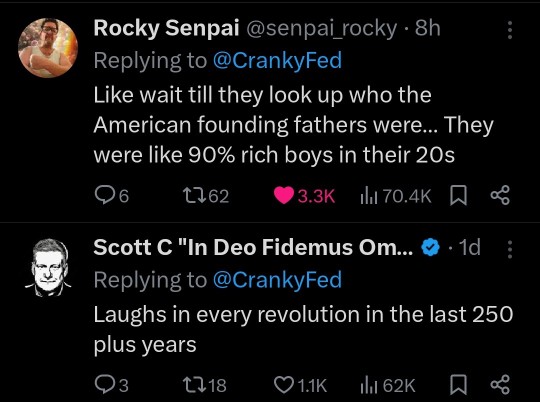
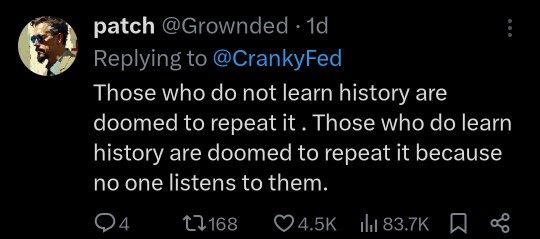
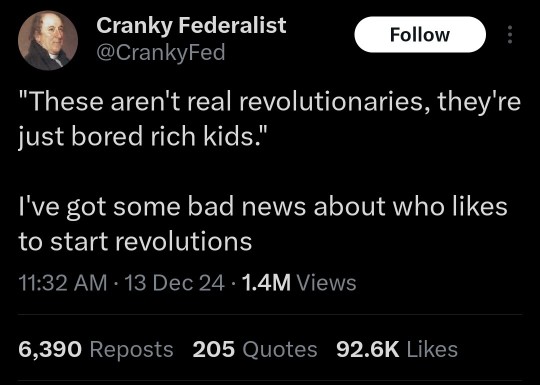
#history#france#usa#politics#the indenpence war isn't a revolution because it wasn't considered one when it happened that's it that's how it works#like real revolutions are seen as revolutions usamericans didn’t call themselves revolutionaries#and the crown didn’t see it as a revolution but a war#just like any colony fighting for freedom it's a war not a revolution#“Revolution are done by rich folks” throw out into the sun#rich folks had an easier access to education that why they were the one in charge but they didn't start it and they couldn’t do it alone#like when Napoleon III did his coup d'etat the rich tried to fight back but the people refused to help and Napi won#never forget that the guy that got the French king decapited was broke and only got his education because of financial aids#truly an icon for the people#btw before some of y'all start yapping I HAVE A DEGREE IN HISTORY#And the independence war isn’t a revolution according to the science that is history#it's us propaganda that calls it a revolution it's not#first post of 2025: me telling usamericans about the Revolution and to stop LYING about it
18K notes
·
View notes
Photo
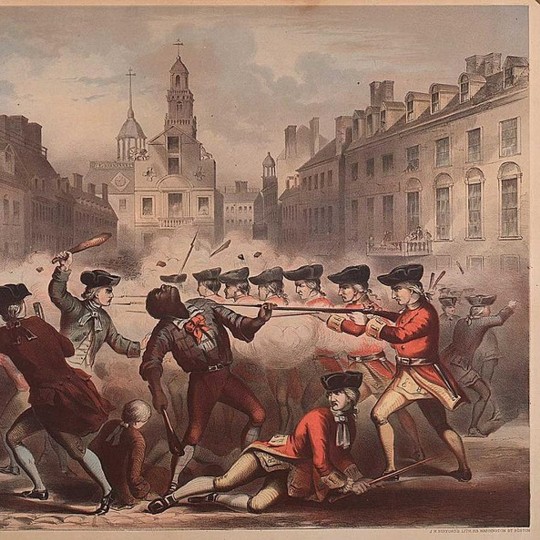
African Americans in the American Revolution
On the eve of the American Revolution (1765-1789), the Thirteen Colonies had a population of roughly 2.1 million people. Around 500,000 of these were African Americans, of whom approximately 450,000 were enslaved. Comprising such a large percentage of the population, African Americans naturally played a vital role in the Revolution, on both the Patriot and Loyalist sides.
Black Patriots
On 5 March 1770, a mob of around 300 American Patriots accosted nine British soldiers on King Street in Boston, Massachusetts. Outraged by the British occupation of their city, as well as the recent murder of an 11-year-old boy, the crowd was filled with Bostonians from all walks of life; among them was Crispus Attucks, a mixed-race sailor commonly thought to have been of African and Native American descent. When the British soldiers fired into the crowd, Attucks was struck twice in the chest and was believed to have been the first to die in what became known as the Boston Massacre. He is regarded, therefore, as the first casualty of the American Revolution and has often been celebrated as a martyr for American liberty.
Five years later, in the early morning hours of 19 April 1775, a column of British soldiers was on its way to seize the colonial munitions stored at Concord, Massachusetts, when it was confronted by 77 Patriot militiamen on Lexington Green. Standing in this cluster of militia was Prince Estabrook, one of the few enslaved men to reside in Lexington, who had picked up a musket and joined his white neighbors in defending his home. In the ensuing Battles of Lexington and Concord, Estabrook was wounded in the shoulder but recovered in time to join the Continental Army two months later. He was selected to guard the army headquarters at Cambridge during the Battle of Bunker Hill (17 June 1775) and was freed from slavery at the end of the war.
Attucks and Estabrook were just two of the tens of thousands of Black Americans who supported the American Revolution. There was no single motivation for their doing so. Some, of course, were inspired by the rhetoric of white revolutionary leaders, who used words like 'slavery' to describe the condition of the Thirteen Colonies under Parliamentary rule and promised to forge a new society built on liberty and equality. These words obviously appealed to the enslaved population, many of whom were optimistic that, even if slavery was not entirely abolished, they might receive better opportunities in this new nation. Others enlisted in the Continental Army to secure their individual freedoms, as the Second Continental Congress had proclaimed that any enslaved man who fought the British would be granted his freedom at the end of his service. African Americans also enlisted to escape the day-to-day horrors of slavery, to collect the bounties and soldiers' pay offered by recruiters, or simply because they were drawn to the adventure of a soldier's life. Additionally, several Black Americans were forced to enlist by their Patriot masters, who preferred to send their slaves to fight instead of going themselves.
Of course, not all Black Patriots served in the Continental Army or Patriot militias. Some, like James Armistead Lafayette, were spies; posing as a runaway slave, Lafayette was able to infiltrate the British camp of Lord Charles Cornwallis and procure vital information that helped lead to the Patriot victory at the Siege of Yorktown. The French general Marquis de Lafayette was impressed with his service and helped procure his freedom after the war, leading James Lafayette to adopt the marquis' name.
Other Black Patriots showed their support for the movement with their words. Phillis Wheatley was an enslaved young woman who had been brought to Boston from Senegal, where she had been seized. She was purchased by the Wheatley family, who quickly recognized her literary talents and encouraged her to write poetry. By the early 1770s, Phillis Wheatley was already a celebrated poet. She began to write extensively on the virtues of the American Revolution, praising Patriot leaders like George Washington. Despite his status as a slaveholder, Washington was moved by Wheatley's work and invited her to meet him, stating that he would be honored "to see a person so favored by the muses" (Philbrick, 538).
Continue reading...
72 notes
·
View notes
Text
Unwavering Faith: Aveline and the Colonial Assassins (Analysis)

Over the years, I've come to notice a dual parallel and theme between the premise of AC Rogue and the side title, Liberation:
The loss of faith. Despite its intentionally ambiguous portrayal of the Assassins, Liberation compellingly explores their flaws, contradictions, and hidden layers through characters like Agate and François Mackandal respectively. This, in turn, profoundly impacts Aveline's mental state and her faith in her sect of the Colonial Assassins and their Creed.
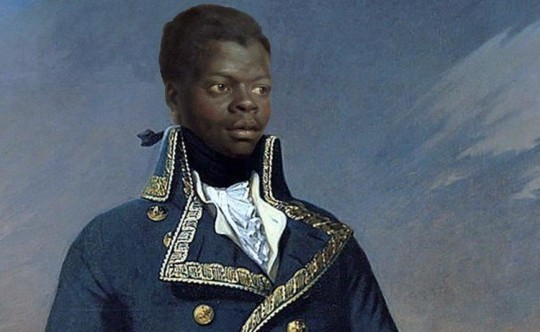
Mackendal, in particular, was a very fascinating character not just in the historical context, but in what he encompassed for the ideals and values of the Assassins when pressed to their logical extreme in using their Creed as a policy for aggression, violence, and unrestrained use of power. An example of this is how he aimed to poison the colonists in Saint-Dominique.
The Mackandal Rebellion (1750-1758) | Haitian Revolution (1791-1804)
What's interesting is that despite his atrocities, Mackandal didn't think he was a traitor of any kind to the Brotherhood or what it preached. Much Like Altair who didn't believe so when he killed his Mentor. Neither did Pierre Bellec when he killed Mirabeau in Unity. Mackandal, in fact, firmly believed he was an Assassin, even truer than the Colonials themselves. From his perspective, he didn't kill "innocents." He just didn't see any of the "white masters" at the time as remotely innocent. Clearly, he was wrong from any other point of view, but it doesn't make him less of an Assassin. After all, the Creed does allow it if you want it to.

In some regards, he shares a sharp contrast with Adewale himself. Both men are shaped by their brutal experiences as slaves, embodying contrasting conclusions with the Assassin's Creed. Mackandal, corrupted by deep-seated anger, employs ruthless and indiscriminate methods such as poisonings, reflecting a radical approach that often causes collateral damage that ultimately catches up to him destroying himself and his Brotherhood. In contrast, Adewale, motivated by a strong sense of justice and compassion, remains steadfast in his convictions and humanity for himself and others. As a result, Mackandal's legacy is often treated as a cautionary tale, while Adewale retaining his morals and principles through the Creed is still remembered and admired by even individuals like Evie Frye an entire century later. This duality between them underscores the larger internal struggle that individuals within the Brotherhood face in response to both oppression and their endless fight for and to preserve freedom. This era of the Assassins, especially, is faced with this dilemma where the very freedom that they fight for is often short-lived, imperfect, nuanced, and bittersweet. 'Laid to Rest' Transcript

Connor: "My father is dead. Charles Lee now leads the Templar Order in his place. I see now why ours is an eternal war. For each piece taken from the board, another is placed upon it. Back and forth we go. Across the world. Across the ages. Some days, mine feels an impossible task, but I cannot afford to be consumed with doubt. The people need me. Now, more than ever. I must stop the Templars. I will kill Charles Lee." Connor's Forsaken Epilogue Soliloquy Connor: "So many voices, each demanding something else… It has been hard at times, but never harder than today to see all I worked for; perverted, discarded, forgotten!"

This brings us to the inner turmoil and duality that Aveline struggles with over the course of her story. Who is she really? Why does she fight? Is it even worth the effort to fight at all in such an unjust world?
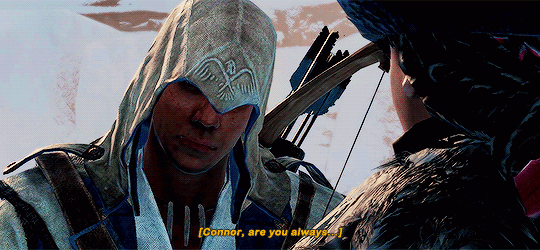
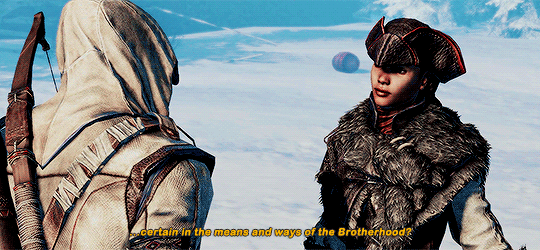
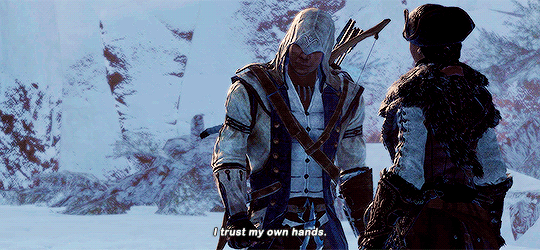
"I trust my own hands," I believe, is Connor expressing his adherence to individualism above all else. For him, it signifies the realization that even the people and institutions you serve can be flawed or have misguided intentions, and you must trust your own judgment. This mindset makes Connor an embodiment of the Creed and its ideals—an approach that Aveline also adopts. Her persistent fight for choice and freedom, despite the hypocrisy, corruption, and fallibility within her own order, makes her dedication as an Assassin truly compelling. Because Aveline is more than just an Assassin. She is a liberator.
#assassin's creed#connor kenway#ratonhnhaké:ton#adewale#assassin's creed 4#ac liberation#aveline de grandpre#francois mackendal#achilles davenport#assassin's creed rogue#shay patrick cormac#seriously the colonial era was super interesting for both groups#Aveline deserves some appreciation too y'all#Her arc is seriously underrated
58 notes
·
View notes
Note
Not that one poster but I think the revolution will kill thousands of people because that's historically what has happened in every revolution. Even in Palestine you can see civilians and children being killed for daring to revolt, and the disabled also get left behind to die with no accessible medications or hospitals as they've all been bombed. I don't see a way it could work without this happening though so it ends up being a "Some of you may die but that's a price I'm willing to pay", which... Isn't that different from the other side who's also willing to let others die for their ideology.
Source: https://www.google.com/amp/s/www.aljazeera.com/amp/news/2023/10/27/people-with-disabilities-not-spared-from-israels-war-machine-on-gaza-strip
I wasn't trying to argue that in a revolution, nobody would possibly die. I was trying to figure out why, in that person's mind, the two options seem to be "vote for Kamala" or "tens of millions of people die in a four year long revolutionary bloodbath".
Besides, as was already pointed out, people are already dying under capitalism and imperialism and colonialism. The people of Palestine did not fight back for no good reason, they fought back because they were dying at the hands of the Israeli occupation.
I don't think in the United States specifically we're going to suddenly have mass support for revolutionary socialism in the next four years, but for the same reasons, I don't think Trump is going to be able to magically install a fascist dictatorship by virtue of winning another term.
The conditions that provide opportunities for fascists also provide opportunities for socialists. We are in a minor economic downturn at the moment for sure. Prices are going up, wages are still stagnating, lots of people are having to stretch their budgets. But that's ordinary. We have people dying because they can't afford healthcare, and that's horrific, but it's also mundane. It will take an extraordinary economic crisis to push this country onto the brink, and yet such a crisis is inevitable due to the internal contradictions of capitalism.
The relative comfort and stability that the average US citizen experiences is by virtue of the massive poverty and instability that is inflicted on the average person elsewhere in the world. Capitalism and imperialism siphon wealth and labor from the third world and concentrate it in the first world, and any attempts by the masses in the third world to achieve prosperity and security will necessarily disrupt this process. These tensions will inevitably lead to economic collapse within the US and other first world imperialist nations, and this will happen sooner rather than later. Not four years soon, but I would not be surprised if it happened within the next fifty years.
We are not living in a time of peace that a bunch of insane radical leftists are threatening to upend for the sake of ideological purity. We are living in a time where the contradictions of capitalism are once again coming to a head. We are on the brink of another world war. The victory of capitalist counter-revolutionaries in the last century came at the cost of "tens of millions" of lives. Tolerating the imperialist warmongering of US politicians is inexcusable if we are supposed to care about people's lives.
When Kamala Harris brags about the United States having "the most lethal army in the world", she means it. She is more than willing to sacrifice millions of lives on the altar of US hegemony and US control over other nations. The bourgeoisie know full well what is coming and they are already preparing for it. The best time for us to organize was yesterday, and the second best time is today. The Democrats are the enemies of peace and freedom just as much as the Republicans are, and we should not waste our time acting like the former aren't just as eager and willing to throw the rest of us under the bus as the latter are.
36 notes
·
View notes
Note
You taking 22 hours to answer that anon is fine. Hell I would be fine if it took 10 years as you had a family matter to attend to
Now another black thing https://x.com/monstereagle91/status/1782124996111847729?s=46
Okay let me use my assassin Yasuke ideas vs the usual modern black characters are written
Actually it came from early access games when they did colonial thus slavery. In ac black flag your first quartermaster is a runaway slave turn pirate named Adewale who you meet when before you escape the doomed treasure fleet
Oh yeah the ship in the game is supposed to be the theorize ship that escape the storm.
Now Adewale enjoyed the pirate life, but as stated that he never had the same joy as the other golden age pirates and during the story he does stumble upon the assassins and templar because of his captain Edward did as well….well more because he stumbled upon a traitorous master assassin and accidentally gave away the West Indies brotherhood bases.
Ugh sorry adhd. But Edward and Adewale had a fallout, Edward eventually stop his foolish chase to become rich after most of his pirates friends did and properly join the brotherhood like Adewale did.
Now there are standalone dlc called freedom cry where Adewale ends up on Saint Domingo and oh boy they NO problem showing the cruelty of slavery as much they could in a 2013 game even in the database. But there was no Templars involved in the running colony. As that did not matter for freedom cry story show that the assassin brotherhood main cause is to fight for the freedom for all humans.
So yes Adwale played the seeds of the Haitian revolution. Though it was established in the psp game ac liberation that the Saint Domingo assassins were radical and François Mackandal was a extremist that took a twisted view on the brotherhood which lead to the 1751 port au prince earthquake
Sorry for the set up, earlier in the game Edward asked Adewale if there was any place he wanted to go back to. Because at the end of the day Edward was to have enough wealth to tell his father in law to piss off.
Who he later learned was a Templar who let his daughter/Edward first wife die from a fever. No wonder Eddy took care of him after going back to Britain
Ah, I feel like I’m a Tolkien lore detour. But Adewale mention he had no place to go back to and the jackdaw for the time being was his home.
Now to Yasuke, it stated that the devs did change his past a bit. Where he was the only survivor on a slave ship where everyone, including his lover, was killed. And in he eventually ends up under Oda and began a samurai apprenticeship
Iirc, he did have his own house and had a servant. So I think it very likely he would have become the first foreign samurai if not for the hojo incident
What I have a nunace approach with him.
But given he was in Japan for 3 years prior to him disappearing from records. I think they are going with a “foreigner who want to protect his new home” as the basic for his desire to unify Japan in red story.
Also him being an unknown factor to the Templars, as Akechi told then to send Yasuke to goa India, for a bit.
And ac like to do parallels, so it very likely the Japanese brotherhood will be fractured just like how Japan went back to civil war and it up naeo and Yasuke busy rebuilt it
But if I was a head writer on red, I wouldn’t Yasuke as a black ™️ character. I would writer an immigrant who want to protect his new home. Of course I would tackle the whole no ganjin law the Tokugawa set up (though I have a HUGE hunch William Adam is going to join or be ally of the brotherhood to go between Japan and other countries)
But I using universal themes, like coming from nowhere, adapting to a new place. Calling it your new home
The issues when modern black ™️ characters is that activists presume that no one else had slavery ancestry, being oppressed or fucked over by the government
I mean just about everyone did, but no one cling onto the past. Or lionizing their og oppressors or what black Americans did why the Dahomey because they have the same skintone
Wait I heard Indians did with the Mughals….but they been fighting against the lionization the Mughals recently
Sorry I just point out how modern writers treat black people like aliens vs humans
I know you're good I still like to be prompt if I can, had to pop out real quick last night so this one is delayed too now, lol.
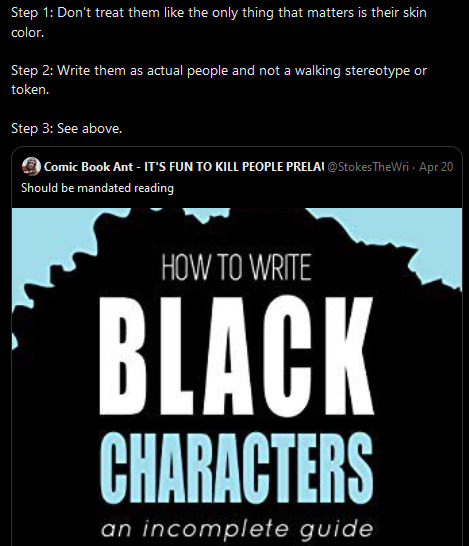
ya this is gonna confuse people.
story starting Oh yeah the ship in the game is supposed to be the theorize ship that escape the storm.
Kinda how it worked IRL for William Addams
Now Adewale enjoyed the pirate life, but as stated that he never had the same joy as the other golden age pirates and during the story he does stumble upon the assassins and templar because of his captain Edward did as well….well more because he stumbled upon a traitorous master assassin and accidentally gave away the West Indies brotherhood bases.
Oopsie
Ugh sorry adhd. But Edward and Adewale had a fallout, Edward eventually stop his foolish chase to become rich after most of his pirates friends did and properly join the brotherhood like Adewale did.
FMA time, hopefully without Nina and Alexander this time
So yes Adwale played the seeds of the Haitian revolution. Though it was established in the psp game ac liberation that the Saint Domingo assassins were radical and François Mackandal was a extremist that took a twisted view on the brotherhood which lead to the 1751 port au prince earthquake
I need to not do this tired because I saw "François Mackandal" and I was gonna say there's something fishy about him because I thought his last name was Mackerel
Sorry for the set up, earlier in the game Edward asked Adewale if there was any place he wanted to go back to. Because at the end of the day Edward was to have enough wealth to tell his father in law to piss off.
That does not say "Alphonse" I'm dumb, dyslexia and tired reading don't mix so I'll do the rest in the morning, but leave all that so everyone can have a hearty laugh.
But given he was in Japan for 3 years prior to him disappearing from records. I think they are going with a “foreigner who want to protect his new home” as the basic for his desire to unify Japan in red story. Also him being an unknown factor to the Templars, as Akechi told then to send Yasuke to goa India, for a bit. And ac like to do parallels, so it very likely the Japanese brotherhood will be fractured just like how Japan went back to civil war and it up naeo and Yasuke busy rebuilt it
I like this and the stuff before too, nice thing about historical fiction, even with real people, is you can fiddle with details.
But if I was a head writer on red, I wouldn’t Yasuke as a black ™️ character. I would writer an immigrant who want to protect his new home. Of course I would tackle the whole no ganjin law the Tokugawa set up (though I have a HUGE hunch William Adam is going to join or be ally of the brotherhood to go between Japan and other countries) But I using universal themes, like coming from nowhere, adapting to a new place. Calling it your new home
I could see people getting ticked off if he's not tokenized, lot of anti-racists get mad if you don't play to stereotypes for some reason.
The issues when modern black ™️ characters is that activists presume that no one else had slavery ancestry, being oppressed or fucked over by the government I mean just about everyone did, but no one cling onto the past. Or lionizing their og oppressors or what black Americans did why the Dahomey because they have the same skintone Wait I heard Indians did with the Mughals….but they been fighting against the lionization the Mughals recently
Ya pretty much everyone did in one form or another, slavery is a pretty solid historical thing right up till the 1800's when some people decided that should stop.
Sorry I just point out how modern writers treat black people like aliens vs humans
Part of that is concern over being "canceled" for writing just the wrong thing, which is one of the big reasons it's all gotten to where it is now.
And the audience is also berated if they opt to not consume something because the only reason could be that they're racist.
Racism is killing creativity, but not the kind of racism people want to talk about.
2 notes
·
View notes
Text
The 51st State is Puerto Rico idiots
I am Canadian, but I grew up in the USA. Specifically Connecticut, in Fairfield County. By grew up it was from 2 months old to 21 years.
I was born in Winnipeg Manitoba. My father got a job in a research lab just outside of New York City. That is why this situation occurred. I could have and perhaps should have got a US citizenship, but I did not.
All countries have their myths and legends. England has King Arthur, France has Napoleon. The USA has the founding fathers. I know the US national anthem, when it was written and the music it was based on as Francis Scott Key was not a composer, but a poet. I know that the story of the US revolution was not about freedom and liberty.
I can go on about that and I may later.
When I graduated University I moved to Western Canada. Jobs for engineers were not easy to find in New England, which is what they still call that part of the USA. I found a good job in Alberta as an Engineer. Had I not I may have got US citizenship like my brother did.
Part of my decision was an unease I had with the stories and myths the US puts into the heads of school kids. They are a very conservative society. In Elementary School we had to recite the lord's prayer and pledge allegiance to a flag. This was in Liberal left wing New England. Imagine the stuff they did in the conservative south. By the time I was in middle school the prayers and pledge were no longer required. On the TV news the two main subjects were black people fighting for the same rights white people had, and a war in Asia against a small country.
A nation that beats its chest about freedom but denies it to some people? A nation that is proud that it threw off the yoke of a colonial foreign nation is at war to impose its will on another country? This was the daily news and weekly magazines, and a message pounded into the population. And it was not right. It was not true.
When as a child I knew things. I had no allegiance to that flag, my flag was different. The tyrant that was overthrown was the few times great grandfather of the sovereign I was supposed to be loyal too. I did not believe in that god as the stories made no sense. But I went along so as to not be an outsider. I grew up with heavy doubts.
So when I moved back to Canada it was with a sense of relief and hope and a feeling of not really belonging there either. But the myths were gentler and mostly true. There was no range wars against Indians. There were unfair treatment and other things. But Canada proved to be a loyal and reliable friend and ally when called upon. World War One started in 1914 for Canada. The US did not show up until it was almost over in 1917. World War 2 started in 1939 for Canada. Canadian soldiers were dying in battle while the US was debating and a nascent American Nazi party was formed. The USA joined the side of good and true in late 1941.
Canada has a real tradition of trying to be just. Perfect, far from it.
The destination of the underground railroad for escaped slaves was Canada, not northern states. There was a federal law to capture and return to the South those that got only as far as the Northern States.
Land of the Free, its Canada not the US.
Every nation in West Europe is free and democratic. There are rights for people and the rule of laws applied equally to all. A minority of people elected a US president that has bragged that laws do not apply to him. He is a convicted Felon. Convicted by a jury. (By minority I mean of eligible voters. Trump had 31% of all those who could have voted.)
The US has serious dangerous problems, and they are all of their own making. There are too many guns. There is digitally spread hate and racism. There is a failed health system, that is so bad the life expectancy of an average American is lower than any other major nation. But worst of all is the leadership is based on lies. Truth is a stranger to most of the elected US government. That is exacerbated by a extreme right wing media company (owned by a foreigner) that supports radical right views far beyond reason or truth.
So what rational intelligent nation would submit to the fate of being forced under threats to join the US. Not Canada.
If 20% of people here think it would be good, fine. That is a minority. If they want they should just move there and be done with it. They mostly look and sound just like Americans. Trump may even not deport them.
Under force it would put Canada at war with the US. For the record the worlds longest sniper kill was by a Canadian Sniper. Snipers are allowed in a state of war.
So if you want to add a star to the flag just give it to Puerto Rico, they want it. If you do not want to change the flag just give Hawaii back to the people the US took if from illegally. Or I like the Idea of Canada annexing Alaska. We could pay every Alaskan a million bucks to vote for that. It would make the map so much nicer.
Oh about the US revolution. That was because Slavery was about to become against the law in the English Colonies. A series of court cases in England in 1763 to 1772 found the state of Slavery not supported by law. That would lead to it being codified and enforceable in the Colonies. The leaders of the Rebellion were mostly southern plantation slave owners. Slavery was a major item in the Colonial economy and making it illegal would be crippling. So other reasons and excuses were invented. Those became the history as history is written by the winners.
0 notes
Note
I want some games where i play as a soldier or civilian in a war y'know?, with all the trauma and war crimes that come with it
THEME: War, Combat, Trauma.
Hello friend. I haven't found any games about civilian trauma yet, but there's certainly plenty of games about soldiers, expecially in revolution. Here are three recommendations for you.



Our Final Struggle, by Loreshaper Games.
You’ve been chosen to lead the assault on the Imperial Palace. After three years of war, the Eighth Shock Legion has arrived on Minaret, to end the Empire’s rule and bring peace.
You will go on ahead. You’ve been chosen for your unique skills, honed during the revolution. Your mission: capture the Imperial family, or eliminate them if capture is impossible.
This game is a quick read: it gives you enough of the setting to tell you where the players start off, without giving you chapters of lore, which means it’s up to the table to decide what the Empire is like, and why it must be brought down. Players will have to answer questions about who they were before they joined up, and the game uses 5d6 as well as a graded level of success.
There’s less about trauma implicitly written into this game, so consider this to be a place where you can decide how much you want to explore or not. What if the Imperials hold innocents amongst their numbers? Does your group have the right to act as jury, judge and executioner? If you are going to explore these themes, I recommend you have a Session 0 with your group before playing, set up some lines and veils, and ensure the use of safety tools throughout the course of play.
Guns Blazing, by Havocfett.
Guns Blazingis a roleplaying game about revolutionaries and freedom fighters at the dusk of the colonial age. Players enter the myriad flashpoints of the age, thrown against the machinations of colonial powers and supernatural monsters from without while navigating the contradictory, seemingly irreconcilable politics of change within.
Guns Blazing runs on an original engine, called Ahadi, styled loosely on Genesys and Storyteller. Characters engage in brutal, tactical gunfights against monstrous foes, where goals are clear, the enemy is obvious, and you can measure success in spent bullets and dead bodies. Then they return to the home front, where their allies hate each other, you don’t know who to trust, and success is a formless dream of a better future.
This game is still in playtest, but even the playtest puts you inside a war zone, with threats both mundane and supernatural. Don’t expect much for layout in the current document, but the Kickstarter shows a lot of promise. I’m fascinated at the potential of this game to talk about war in a context that’s much bigger than just the fights themselves.
Nasty, Brutish & Long, by NotWriting.
Nasty, Brutish, & Long is a tabletop role-playing game about class war and revolution in your own fantastical setting. Based on the Forged in the Dark system, this rules-light game puts characters divided by class and resources front and center in a world on the brink of permanent change. Will your bastard noble defend their small town from the Church's magic-hunting inquisition? Will your character successfully organize their fellow factory workers against the foremen? Or will your merchant wheel and deal to secure themselves in a world torn apart by new Gods? Play to find out how the revolution fares against the world!
Forged in the Dark games do a really good job of putting your characters into dangerous situations and forcing them to wrestle with both physical trauma and the struggle of keeping yourself emotionally intact. In this game, players must expend resources over a period of time in order to reduce the daily stress of partaking in a revolution. If they don’t have time or resources, that stress will manifest as a Vice, an element of that character’s personality that inhibits their ability to get along with other people.
One thing I really like about this game is that it employs something called a Taste Menu, something similar to Lines & Veils in that it asks players to sit down and discuss what subjects they’d like to explore before diving into play. The author also includes a description of the X Card, which is another excellent tool to use at your table.
40 notes
·
View notes
Text
Pink diamond doesn't deserve hate
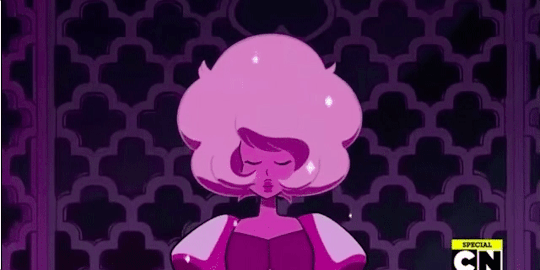
I think the hate for pink diamond is wrong cuz she honestly didn't do anything anybody else wouldn't do in that situation.
Let's break it down in order:
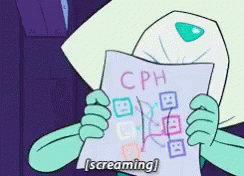
Pink pearl was damaged by mistake, Pink was mad at the other diamonds had an outburst of power (like Steven has when extremely upset) and Pink pearl was caught in it and was harmed by mistake. Yes her trauma from it is real but we have to acknowledge that wasn't intentional and that she clearly cared for Pink pearl as a friend.
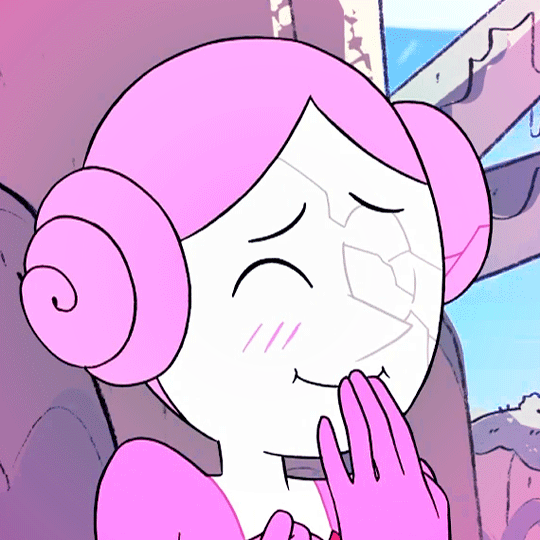
Spinel: Pink diamond had no real choice, from the way I see it. She never planned on leaving her forever cuz she never planned on leaving her life as a diamond forever. Yes it's crappy that she left her standing there alone for a long time in general but gems are capable of going against their diamonds orders and she was shown to not listen so its fully possible she assumed that spinel would get bored and do something else.
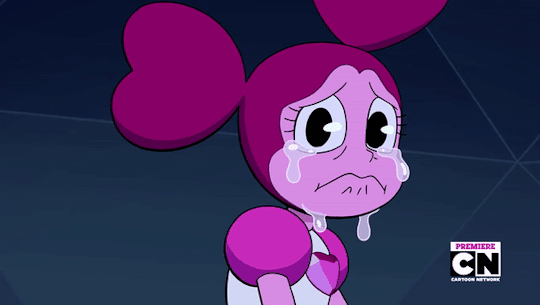
Bismuth: bismuth was planning on murdering other gems and was shown to be unwilling to listen. Don't focus on the recon of her character later in the show. She was far from reasonable and was a danger to everyone. Her not telling the other gems may have been because she didn't want to lose more friends, cuz if they did take bismuth's side she would have to bubble them too. Not to mention her choosing to bubble her was far better than what she could have done.
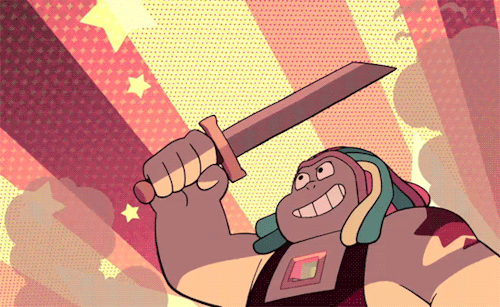
Faking her death: fuck the diamonds, they abused her and she wanted to escape and deserved to escape. They smothered Steven but were shown to be down right abusive to Pink. Her room was full of tiny pebbles born of her tears. Every one of her memories with them were negative. They might miss her but they never really act themselves if they deserved her as their family. In my opinion, they didn't. Not to mention they are the root of all of this, they abused and ignored her causing her to have a outburst like any powerless person would do in that situation and harm her only friend.
They refused to end the colony cuzing her to create the crystal gems. They made her essentially have to fight on two sides of a war. With her death being the only real option.
Cuz let's been clear, if they knew pink diamond was rose quartz there would be no war cuz they would just force her to come back. They were bigger and stronger than her and white diamond can easily brainwash her. Rose quartz being the figure head allowed for them to keep their distance and only get involved when they felt it was necessary in order to teach her to be a leader and fall back completely when they thought pink died.

Also it annoys me that the show seem to have a problem with her faking her death. Like the fact that she didn't kill herself for the Revolution is a bad thing on her part. Like her giving up her life and family for both the people on the planet and gems who wanted freedom meant nothing cuz "she faked her death" like she didn't try talk no Jujutsu for probably centuries with her only reward being a zoo full of people. Like she wasn't fighting on the Frontline and didn't make hard choices to minimize casualties. She may not have been perfect but she set the Foundation that steven walked on to end the diamond Authority.
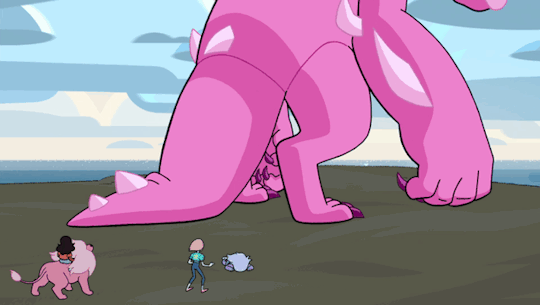
I get that she lied and wasnt perfect but i feel like the show missed mutiple opportunities to state "idealizing someone is not good" I mean from the beginning they had steven freaking out cuz he wasn't "perfect like rose" they made it seem like she was the perfect most loving, capable and beautiful person ever. And the moment they saw her faults, they started to distance themselves and act as if everything she ever done was a lie. They made this person into a God and got mad the moment the universe made it care she was a person. And them doing that hurt steven, they pushed steven into feeling like he had to be like his mom. Than that he had to be a better version of her and the moment the cracks started to form, he started to think that he was a monster cuz thats what he's flawed mom is in his eyes.
Steven was never able to process his flaws cuz he spent 14 years believing he was following in the foot steps of someone without flaws and 2 years making up for the flaws of his mother and everyone else around him. And this is all cuz the gems refused to acknowledge the rose was capable of making mistakes.

My point isn't that she is without fault or some innocent pure character but that she wasn't some evil psycho. She didn't go out of her way to harm others things just happened and people got hurt. That is how life is, no matter how good you are you might leave 100s of people picking up the pieces of glass that was your shattered life. I am a strong believer that intent and action go hand and hand. You can hate someone's actions but respect their intent.
69 notes
·
View notes
Note
I would define a revolution as changing the government of the country, not changing who is in charge under the same system. Seems like my second sentence was pretty clear. The form of government that was instituted in the former colonies in 1787 might have been revolutionary, but was based on extensions of ideas about their culture's rights and duties of citizens. Furthermore the Constitution was not drafted until four years after the war for Independence was over. A good case could be made that the true American revolution was not armed at all, it was purely political, and distinct from the war against the UK.
"exerted more power than was permitted under previous structures and a radical change in the conception of who held authority. Is that revolutionary? And if not," - that's a false choice. I don't think it was all that radical, merely an extension of changes in the form of government in the UK, following the better-named Glorious Revolution. The US just ran further, faster with the change to a more popular, representative government, and the whole taxation without representation issue calls into question just how much the government of the UK actually was theirs at all. You could argue that each Amendment to the Constitution is a revolution if you are going to be so expansive as to say that one party having "more power than was permitted under previous structures" is revolutionary.
By the same token, denying that definition does not render it ineligible to the French and Russian revolutions. It doesn't matter whether the new rulers had more or less power, or people in charge were good or bad or how they exerted the power they had won. The government was changed by violence.
By contrast, the people of the US repudiated the government of the UK and elected their own. The UK attempted to conquer the US, and failed. Then, 11 years after the repudiation of the former government, and six years after the new government was agreed upon, a different form of government was proposed, debated, agreed upon and came into law about 19 years after the start of violence, 14 years after military was taken action against America, 13 years after the British government was formally rejected by the states in congress, 8 years after the original agreement between the independent states was made and 6 years after a peace treaty was made with the UK. The fact that the US and UK signed a peace treaty pretty much means there was no revolution, since they recognized each other's existence and sovereignty. The changes in the American government happened in 1776, 1781 and 1789. The war with the UK was fought between 1775 and 1783. Military action had no direct correlation with the Declaration of Independence, the Articles of Confederation or the Constitutional Convention or ratification. So I would argue that the American Revolution, such as it was, was purely political and philosophical, and the fighting was ancillary to the true creation of the Republic, albeit a necessary precondition. We would not have maintained independence or gained a republic without the war, but the war was a separate thing, and not the driving force of the changes. The British could have conquered the continent, torn up the declaration, and hanged or shot all the members of Congress, but the American republic would still have lived for whatever time it had. And at no time did the Continental Army (or civilian mobs) make the law or establish a governing authority. There was no point where a bunch of guys with guns stared down authority figures and said "we are going to have three branches of government to check and balance each other" or "you WILL grant us a bicameral legislature" or "there will be no laws respecting an establishment of religion or abridging the freedom of the press or of speech or the right of assembly, got it?"
I don't happen to know of any other times in history where a political revolution was carried out independent of the related armed struggle. For most of them, the former comes directly from the latter.
Has there ever been a case in history where an armed revolution leads to a democratic, stable government?
You mean like...the United States?
-SLAL
46 notes
·
View notes
Text
Anonymous asked: I enjoyed reading your posts about Napoleon’s death and it’s quite timely given its the 200th anniversary of his death this year in May. I was wondering, because you know a lot about military history (your served right? That’s cool to fly combat helicopters) and you live in France but aren’t French, what your take was on Napoleon and how do the French view him? Do they hail him as a hero or do they like others see him like a Hitler or a Stalin? Do you see him as a hero or a villain of history?
5 May 1821 was a memorable date because Napoleon, one of the most iconic figures in world history, died while in bitter exile on a remote island in the South Atlantic Ocean. Napoleon Bonaparte, as you know rose from obscure soldier to a kind of new Caesar, and yet he remains a uniquely controversial figure to this day especially in France. You raise interesting questions about Napoleon and his legacy. If I may reframe your questions in another way. Should we think of him as a flawed but essentially heroic visionary who changed Europe for the better? Or was he simply a military dictator, whose cult of personality and lust for power set a template for the likes of Hitler?

However one chooses to answer this question can we just - to get this out of the way - simply and definitively say that Napoleon was not Hitler. Not even close. No offence intended to you but this is just dumb ahistorical thinking and it’s a lazy lie. This comparison was made by some in the horrid aftermath of the Second World War but only held little currency for only a short time thereafter. Obviously that view didn’t exist before Hitler in the 19th Century and these days I don’t know any serious historian who takes that comparison seriously.
I confess I don’t have a definitive answer if he was a hero or a villain one way or the other because Napoleon has really left a very complicated legacy. It really depends on where you’re coming from.
As a staunch Brit I do take pride in Britain’s victorious war against Napoleonic France - and in a good natured way rubbing it in the noses of French friends at every opportunity I get because it’s in our cultural DNA and it’s bloody good fun (why else would we make Waterloo train station the London terminus of the Eurostar international rail service from its opening in 1994? Or why hang a huge gilded portrait of the Duke of Wellington as the first thing that greets any visitor to the residence of the British ambassador at the British Embassy?). On a personal level I take special pride in knowing my family ancestors did their bit on the battlefield to fight against Napoleon during those tumultuous times. However, as an ex-combat veteran who studied Napoleonic warfare with fan girl enthusiasm, I have huge respect for Napoleon as a brilliant military commander. And to makes things more weird, as a Francophile resident of who loves living and working in France (and my partner is French) I have a grudging but growing regard for Napoleon’s political and cultural legacy, especially when I consider the current dross of political mediocrity on both the political left and the right. So for me it’s a complicated issue how I feel about Napoleon, the man, the soldier, and the political leader.

If it’s not so straightforward for me to answer the for/against Napoleon question then it It’s especially true for the French, who even after 200 years, still have fiercely divided opinions about Napoleon and his legacy - but intriguingly, not always in clear cut ways.
I only have to think about my French neighbours in my apartment building to see how divisive Napoleon the man and his legacy is. Over the past year or so of the Covid lockdown we’ve all gotten to know each other better and we help each other. Over the Covid year we’ve gathered in the inner courtyard for a buffet and just lifted each other spirits up.
One of my neighbours, a crusty old ex-general in the army who has an enviable collection of military history books that I steal, liberate, borrow, often discuss military figures in history like Napoleon over our regular games of chess and a glass of wine. He is from very old aristocracy of the ancien regime and whose family suffered at the hands of ‘madame guillotine’ during the French Revolution. They lost everything. He has mixed emotions about Napoleon himself as an old fashioned monarchist. As a military man he naturally admires the man and the military genius but he despises the secularisation that the French Revolution ushered in as well as the rise of the haute bourgeois as middle managers and bureaucrats by the displacement of the aristocracy.
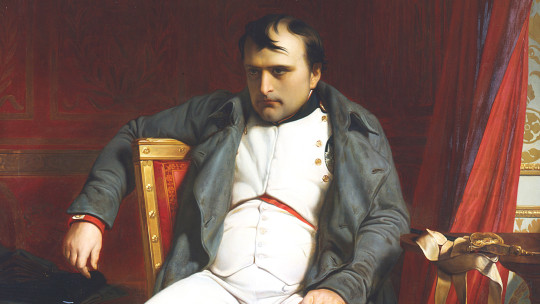
Another retired widowed neighbour I am close to, and with whom I cook with often and discuss art, is an active arts patron and ex-art gallery owner from a very wealthy family that came from the new Napoleonic aristocracy - ie the aristocracy of the Napoleonic era that Napoleon put in place - but she is dismissive of such titles and baubles. She’s a staunch Republican but is happy to concede she is grateful for Napoleon in bringing order out of chaos. She recognises her own ambivalence when she says she dislikes him for reintroducing slavery in the French colonies but also praises him for firmly supporting Paris’s famed Comédie-Française of which she was a past patron.
Another French neighbour, a senior civil servant in the Elysée, is quite dismissive of Napoleon as a war monger but is grudgingly grateful for civil institutions and schools that Napoleon established and which remain in place today.
My other neighbours - whether they be French families or foreign expats like myself - have similarly divisive and complicated attitudes towards Napoleon.

In 2010 an opinion poll in France asked who was the most important man in French history. Napoleon came second, behind General Charles de Gaulle, who led France from exile during the German occupation in World War II and served as a postwar president.
The split in French opinion is closely mirrored in political circles. The divide is generally down political party lines. On the left, there's the 'black legend' of Bonaparte as an ogre. On the right, there is the 'golden legend' of a strong leader who created durable institutions.
Jacques-Olivier Boudon, a history professor at Paris-Sorbonne University and president of the Napoléon Institute, once explained at a talk I attended that French public opinion has always remained deeply divided over Napoleon, with, on the one hand, those who admire the great man, the conqueror, the military leader and, on the other, those who see him as a bloodthirsty tyrant, the gravedigger of the revolution. Politicians in France, Boudon observed, rarely refer to Napoleon for fear of being accused of authoritarian temptations, or not being good Republicans.

On the left-wing of French politics, former prime minister Lionel Jospin penned a controversial best selling book entitled “the Napoleonic Evil” in which he accused the emperor of “perverting the ideas of the Revolution” and imposing “a form of extreme domination”, “despotism” and “a police state” on the French people. He wrote Napoleon was "an obvious failure" - bad for France and the rest of Europe. When he was booted out into final exile, France was isolated, beaten, occupied, dominated, hated and smaller than before. What's more, Napoleon smothered the forces of emancipation awakened by the French and American revolutions and enabled the survival and restoration of monarchies. Some of the legacies with which Napoleon is credited, including the Civil Code, the comprehensive legal system replacing a hodgepodge of feudal laws, were proposed during the revolution, Jospin argued, though he acknowledges that Napoleon actually delivered them, but up to a point, "He guaranteed some principles of the revolution and, at the same time, changed its course, finished it and betrayed it," For instance, Napoleon reintroduced slavery in French colonies, revived a system that allowed the rich to dodge conscription in the military and did nothing to advance gender equality.
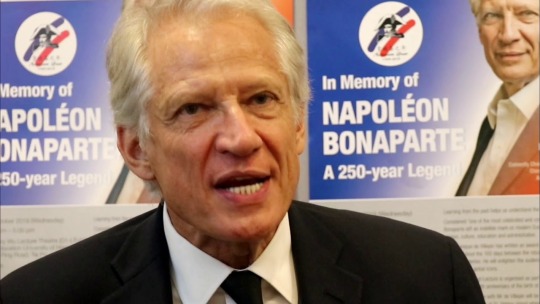
At the other end of the spectrum have been former right-wing prime minister Dominique de Villepin, an aristocrat who was once fancied as a future President, a passionate collector of Napoleonic memorabilia, and author of several works on the subject. As a Napoleonic enthusiast he tells a different story. Napoleon was a saviour of France. If there had been no Napoleon, the Republic would not have survived. Advocates like de Villepin point to Napoleon’s undoubted achievements: the Civil Code, the Council of State, the Bank of France, the National Audit office, a centralised and coherent administrative system, lycées, universities, centres of advanced learning known as école normale, chambers of commerce, the metric system, and an honours system based on merit (which France has to this day). He restored the Catholic faith as the state faith but allowed for the freedom of religion for other faiths including Protestantism and Judaism. These were ambitions unachieved during the chaos of the revolution. As it is, these Napoleonic institutions continue to function and underpin French society. Indeed, many were copied in countries conquered by Napoleon, such as Italy, Germany and Poland, and laid the foundations for the modern state.
Back in 2014, French politicians and institutions in particular were nervous in marking the 200th anniversary of Napoleon's exile. My neighbours and other French friends remember that the commemorations centred around the Chateau de Fontainebleau, the traditional home of the kings of France and was the scene where Napoleon said farewell to the Old Guard in the "White Horse Courtyard" (la cour du Cheval Blanc) at the Palace of Fontainebleau. (The courtyard has since been renamed the "Courtyard of Goodbyes".) By all accounts the occasion was very moving. The 1814 Treaty of Fontainebleau stripped Napoleon of his powers (but not his title as Emperor of the French) and sent him into exile on Elba. The cost of the Fontainebleau "farewell" and scores of related events over those three weekends was shouldered not by the central government in Paris but by the local château, a historic monument and UNESCO World Heritage site, and the town of Fontainebleau.
While the 200th anniversary of the French Revolution that toppled the monarchy and delivered thousands to death by guillotine was officially celebrated in 1989, Napoleonic anniversaries are neither officially marked nor celebrated. For example, over a decade ago, the president and prime minister - at the time, Jacques Chirac and Dominque de Villepin - boycotted a ceremony marking the 200th anniversary of the battle of Austerlitz, Napoleon's greatest military victory. Both men were known admirers of Napoleon and yet political calculation and optics (as media spin doctors say) stopped them from fully honouring Napoleon’s crowning military glory.
Optics is everything. The division of opinion in France is perhaps best reflected in the fact that, in a city not shy of naming squares and streets after historical figures, there is not a single “Boulevard Napoleon” or “Place Napoleon” in Paris. On the streets of Paris, there are just two statues of Napoleon. One stands beneath the clock tower at Les Invalides (a military hospital), the other atop a column in the Place Vendôme. Napoleon's red marble tomb, in a crypt under the Invalides dome, is magnificent, perhaps because his remains were interred there during France's Second Empire, when his nephew, Napoleon III, was on the throne.

There are no squares, nor places, nor boulevards named for Napoleon but as far as I know there is one narrow street, the rue Bonaparte, running from the Luxembourg Gardens to the River Seine in the old Latin Quarter. And, that, too, is thanks to Napoleon III. For many, and I include myself, it’s a poor return by the city to the man who commissioned some of its most famous monuments, including the Arc de Triomphe and the Pont des Arts over the River Seine.
It's almost as if Napoleon Bonaparte is not part of the national story.
How Napoleon fits into that national story is something historians, French and non-French, have been grappling with ever since Napoleon died. The plain fact is Napoleon divides historians, what precisely he represents is deeply ambiguous and his political character is the subject of heated controversy. It’s hard for historians to sift through archival documents to make informed judgements and still struggle to separate the man from the myth.
One proof of this myth is in his immortality. After Hitler’s death, there was mostly an embarrassed silence; after Stalin’s, little but denunciation. But when Napoleon died on St Helena in 1821, much of Europe and the Americas could not help thinking of itself as a post-Napoleonic generation. His presence haunts the pages of Stendhal and Alfred de Vigny. In a striking and prescient phrase, Chateaubriand prophesied the “despotism of his memory”, a despotism of the fantastical that in many ways made Romanticism possible and that continues to this day.
The raw material for the future Napoleon myth was provided by one of his St Helena confidants, the Comte de las Cases, whose account of conversations with the great man came out shortly after his death and ran in repeated editions throughout the century. De las Cases somehow metamorphosed the erstwhile dictator into a herald of liberty, the emperor into a slayer of dynasties rather than the founder of his own. To the “great man” school of history Napoleon was grist to their mill, and his meteoric rise redefined the meaning of heroism in the modern world.
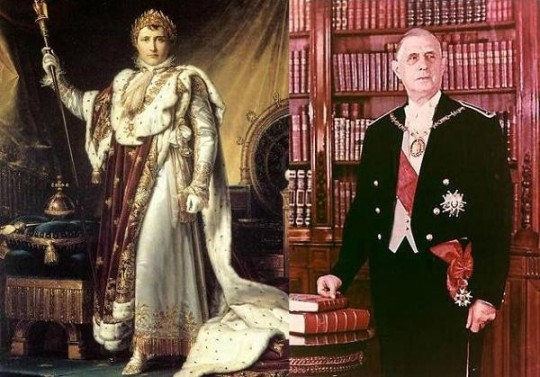
The Marxists, for all their dislike of great men, grappled endlessly with the meaning of the 18th Brumaire; indeed one of France’s most eminent Marxist historians, George Lefebvre, wrote what arguably remains the finest of all biographies of him.
It was on this already vast Napoleon literature, a rich terrain for the scholar of ideas, that the great Dutch historian Pieter Geyl was lecturing in 1940 when he was arrested and sent to Buchenwald. There he composed what became one of the classics of historiography, a seminal book entitled Napoleon: For and Against, which charted how generations of intellectuals had happily served up one Napoleon after another. Like those poor souls who crowded the lunatic asylums of mid-19th century France convinced that they were Napoleon, generations of historians and novelists simply could not get him out of their head.
The debate runs on today no less intensely than in the past. Post-Second World War Marxists would argue that he was not, in fact, revolutionary at all. Eric Hobsbawm, a notable British Marxist historian, argued that ‘Most-perhaps all- of his ideas were anticipated by the Revolution’ and that Napoleon’s sole legacy was to twist the ideals of the French Revolution, and make them ‘more conservative, hierarchical and authoritarian’.

This contrasts deeply with the view William Doyle holds of Napoleon. Doyle described Bonaparte as ‘the Revolution incarnate’ and saw Bonaparte’s humbling of Europe’s other powers, the ‘Ancien Regimes’, as a necessary precondition for the birth of the modern world. Whatever one thinks of Napoleon’s character, his sharp intellect is difficult to deny. Even Paul Schroeder, one of Napoleon’s most scathing critics, who condemned his conduct of foreign policy as a ‘criminal enterprise’ never denied Napoleon’s intellect. Schroder concluded that Bonaparte ‘had an extraordinary capacity for planning, decision making, memory, work, mastery of detail and leadership’. The question of whether Napoleon used his genius for the betterment or the detriment of the world, is the heart of the debate which surrounds him.
France's foremost Napoleonic scholar, Jean Tulard, put forward the thesis that Bonaparte was the architect of modern France. "And I would say also pâtissier [a cake and pastry maker] because of the administrative millefeuille that we inherited." Oddly enough, in North America the multilayered mille-feuille cake is called ‘a napoleon.’ Tulard’s works are essential reading of how French historians have come to tackle the question of Napoleon’s legacy. He takes the view that if Napoleon had not crushed a Royalist rebellion and seized power in 1799, the French monarchy and feudalism would have returned, Tulard has written. "Like Cincinnatus in ancient Rome, Napoleon wanted a dictatorship of public salvation. He gets all the power, and, when the project is finished, he returns to his plough." In the event, the old order was never restored in France. When Louis XVIII became emperor in 1814, he served as a constitutional monarch.
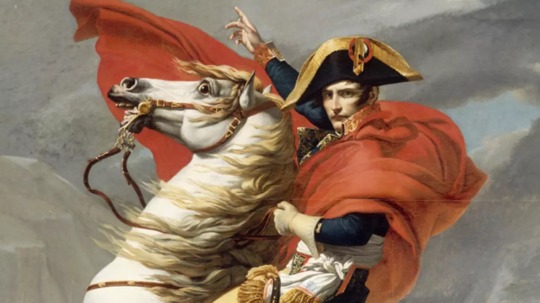
In England, until recently the views on Napoleon have traditionally less charitable and more cynical. Professor Christopher Clark, the notable Cambridge University European historian, has written. "Napoleon was not a French patriot - he was first a Corsican and later an imperial figure, a journey in which he bypassed any deep affiliation with the French nation," Clark believed Napoleon’s relationship with the French Revolution is deeply ambivalent.
Did he stabilise the revolutionary state or shut it down mercilessly? Clark believes Napoleon seems to have done both. Napoleon rejected democracy, he suffocated the representative dimension of politics, and he created a culture of courtly display. A month before crowning himself emperor, Napoleon sought approval for establishing an empire from the French in a plebiscite; 3,572,329 voted in favour, 2,567 against. If that landslide resembles an election in North Korea, well, this was no secret ballot. Each ‘yes’ or ‘no’ was recorded, along with the name and address of the voter. Evidently, an overwhelming majority knew which side their baguette was buttered on.
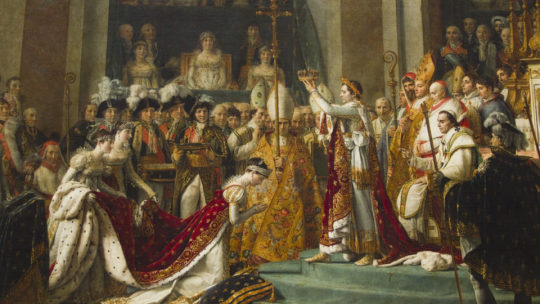
His extravagant coronation in Notre Dame in December 1804 cost 8.5 million francs (€6.5 million or $8.5 million in today's money). He made his brothers, sisters and stepchildren kings, queens, princes and princesses and created a Napoleonic aristocracy numbering 3,500. By any measure, it was a bizarre progression for someone often described as ‘a child of the Revolution.’ By crowning himself emperor, the genuine European kings who surrounded him were not convinced. Always a warrior first, he tried to represent himself as a Caesar, and he wears a Roman toga on the bas-reliefs in his tomb. His coronation crown, a laurel wreath made of gold, sent the same message. His icon, the eagle, was also borrowed from Rome. But Caesar's legitimacy depended on military victories. Ultimately, Napoleon suffered too many defeats.
These days Napoleon the man and his times remain very much in fashion and we are living through something of a new golden age of Napoleonic literature. Those historians who over the past decade or so have had fun denouncing him as the first totalitarian dictator seem to have it all wrong: no angel, to be sure, he ended up doing far more at far less cost than any modern despot. In his widely praised 2014 biography, Napoleon the Great, Andrew Roberts writes: “The ideas that underpin our modern world - meritocracy, equality before the law, property rights, religious toleration, modern secular education, sound finances, and so on - were championed, consolidated, codified and geographically extended by Napoleon. To them he added a rational and efficient local administration, an end to rural banditry, the encouragement of science and the arts, the abolition of feudalism and the greatest codification of laws since the fall of the Roman empire.”
Roberts partly bases his historical judgement on newly released historical documents about Napoleon that were only available in the past decade and has proved to be a boon for all Napoleonic scholars. Newly released 33,000 letters Napoleon wrote that still survive are now used extensively to illustrate the astonishing capacity that Napoleon had for compartmentalising his mind - he laid down the rules for a girls’ boarding school on the eve of the battle of Borodino, for example, and the regulations for Paris’s Comédie-Française while camped in the Kremlin. They also show Napoleon’s extraordinary capacity for micromanaging his empire: he would write to the prefect of Genoa telling him not to allow his mistress into his box at the theatre, and to a corporal of the 13th Line regiment warning him not to drink so much.
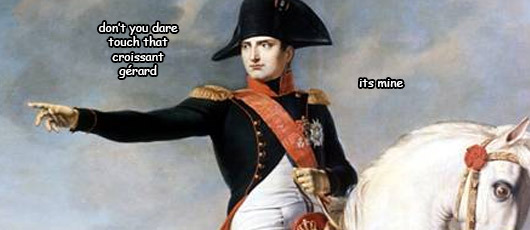
For me to have my own perspective on Napoleon is tough. The problem is that nothing with Napoleon is simple, and almost every aspect of his personality is a maddening paradox. He was a military genius who led disastrous campaigns. He was a liberal progressive who reinstated slavery in the French colonies. And take the French Revolution, which came just before Napoleon’s rise to power, his relationship with the French Revolution is deeply ambivalent. Did he stabilise it or shut it down? I agree with those British and French historians who now believe Napoleon seems to have done both.
On the one hand, Napoleon did bring order to a nation that had been drenched in blood in the years after the Revolution. The French people had endured the crackdown known as the 'Reign of Terror', which saw so many marched to the guillotine, as well as political instability, corruption, riots and general violence. Napoleon’s iron will managed to calm the chaos. But he also rubbished some of the core principles of the Revolution. A nation which had boldly brought down the monarchy had to watch as Napoleon crowned himself Emperor, with more power and pageantry than Louis XVI ever had. He also installed his relatives as royals across Europe, creating a new aristocracy. In the words of French politician and author Lionel Jospin, 'He guaranteed some principles of the Revolution and at the same time, changed its course, finished it and betrayed it.'
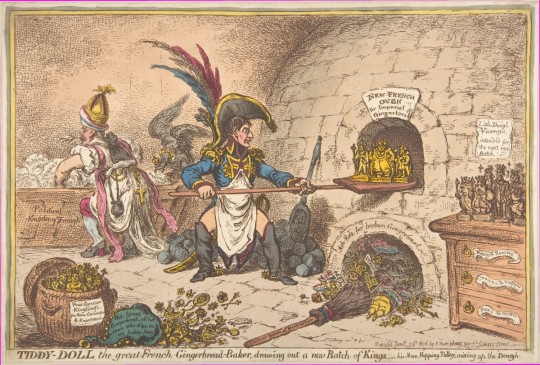
He also had a feared henchman in the form of Joseph Fouché, who ran a secret police network which instilled dread in the population. Napoleon’s spies were everywhere, stifling political opposition. Dozens of newspapers were suppressed or shut down. Books had to be submitted for approval to the Commission of Revision, which sounds like something straight out of George Orwell. Some would argue Hitler and Stalin followed this playbook perfectly. But here come the contradictions. Napoleon also championed education for all, founding a network of schools. He championed the rights of the Jews. In the territories conquered by Napoleon, laws which kept Jews cooped up in ghettos were abolished. 'I will never accept any proposals that will obligate the Jewish people to leave France,' he once said, 'because to me the Jews are the same as any other citizen in our country.'
He also, crucially, developed the Napoleonic Code, a set of laws which replaced the messy, outdated feudal laws that had been used before. The Napoleonic Code clearly laid out civil laws and due processes, establishing a society based on merit and hard work, rather than privilege. It was rolled out far beyond France, and indisputably helped to modernise Europe. While it certainly had its flaws – women were ignored by its reforms, and were essentially regarded as the property of men – the Napoleonic Code is often brandished as the key evidence for Napoleon’s progressive credentials. In the words of historian Andrew Roberts, author of Napoleon the Great, 'the ideas that underpin our modern world… were championed by Napoleon'.
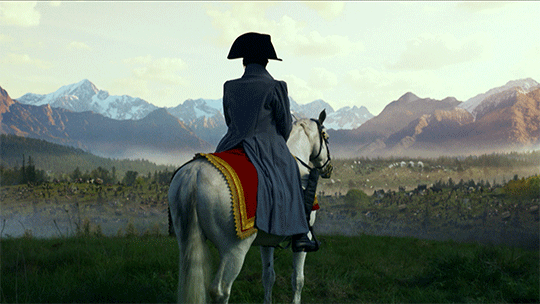
What about Napoleon’s battlefield exploits? If anything earns comparisons with Hitler, it’s Bonaparte’s apparent appetite for conquest. His forces tore down republics across Europe, and plundered works of art, much like the Nazis would later do. A rampant imperialist, Napoleon gleefully grabbed some of the greatest masterpieces of the Renaissance, and allegedly boasted, 'the whole of Rome is in Paris.'
Napoleon has long enjoyed a stellar reputation as a field commander – his capacities as a military strategist, his ability to read a battle, the painstaking detail with which he made sure that he cold muster a larger force than his adversary or took maximum advantage of the lie of the land – these are stuff of the military legend that has built up around him. It is not without its critics, of course, especially among those who have worked intensively on the later imperial campaigns, in the Peninsula, in Russia, or in the final days of the Empire at Waterloo.
Doubts about his judgment, and allegations of rashness, have been raised in the context of some of his victories, too, most notably, perhaps, at Marengo. But overall his reputation remains largely intact, and his military campaigns have been taught in the curricula of military academies from Saint-Cyr to Sandhurst, alongside such great tacticians as Alexander the Great and Hannibal.
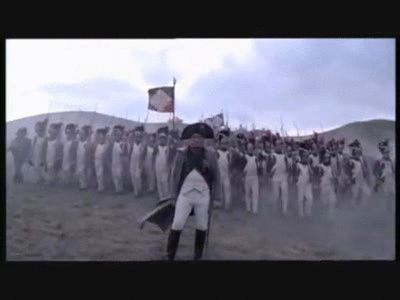
Historians may query his own immodest opinion that his presence on the battlefield was worth an extra forty thousand men to his cause, but it is clear that when he was not present (as he was not for most of the campaign in Spain) the French were wont to struggle. Napoleon understood the value of speed and surprise, but also of structures and loyalties. He reformed the army by introducing the corps system, and he understood military aspirations, rewarding his men with medals and honours; all of which helped ensure that he commanded exceptional levels of personal loyalty from his troops.
Yet, I do find it hard to side with the more staunch defenders of Napoleon who say his reputation as a war monger is to some extent due to British propaganda at the time. They will point out that the Napoleonic Wars, far from being Napoleon’s fault, were just a continuation of previous conflicts that arose thanks to the French Revolution. Napoleon, according to this analysis, inherited a messy situation, and his only real crime was to be very good at defeating enemies on the battlefield. I think that is really pushing things too far. I mean deciding to invade Spain and then Russia were his decisions to invade and conquer.
He was, by any measure, a genius of war. Even his nemesis the Duke of Wellington, when asked who the greatest general of his time was, replied: 'In this age, in past ages, in any age, Napoleon.'
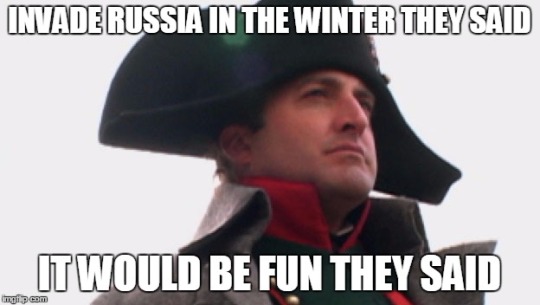
I will qualify all this and agree that Napoleon’s Russian campaign has been rightly held up as a fatal folly which killed so many of his men, but this blunder – epic as it was – should not be compared to Hitler’s wars of evil aggression. Most historians will agree that comparing the two men is horribly flattering to Hitler - a man fuelled by visceral, genocidal hate - and demeaning to Napoleon, who was a product of Enlightenment thinking and left a legacy that in many ways improved Europe.
Napoleon was, of course, no libertarian, and no pluralist. He would tolerate no opposition to his rule, and though it was politicians and civilians who imposed his reforms, the army was never far behind. But comparisons with twentieth-century dictators are well wide of the mark. While he insisted on obedience from those he administered, his ideology was based not on division or hatred, but on administrative efficiency and submission to the law. And the state he believed in remained stubbornly secular.
In Catholic southern Europe, of course, that was not an approach with which it was easy to acquiesce; and disorder, insurgency and partisan attacks can all be counted among the results. But these were principles on which the Emperor would not and could not give ground. If he had beliefs they were not religious or spiritual beliefs, but the secular creed of a man who never forgot that he owed both his military career and his meteoric political rise to the French Revolution, and who never quite abandoned, amidst the monarchical symbolism and the court pomp of the Empire, the republican dreams of his youth. When he claimed, somewhat ambiguously, after the coup of 18 Brumaire that `the Revolution was over’, he almost certainly meant that the principles of 1789 had at last been consummated, and that the continuous cycle of violence of the 1790s could therefore come to an end.
When the Empire was declared in 1804, the wording, again, might seem curious, the French being informed that the `Republic would henceforth be ruled by an Emperor’. Napoleon might be a dictator, but a part at least of him remained a son of the Enlightenment.
The arguments over Napoleon’s status will continue - and that in itself is a testament to the power of one of the most complex figures ever to straddle the world’s stage.
Will the fascination with Napoleon continue for another 200 years?
In France, at least, enthusiasm looks set to diminish. Napoleon and his exploits are scarcely mentioned in French schools anymore. Stéphane Guégan, curator of the Musée d'Orsay in Paris, which, among other First Empire artworks, houses a plaster model of Napoleon dressed as a Roman emperor astride a horse, has described France's fascination with him as ‘a national illness.’ He believes that the people who met him were fascinated by his charm. And today, even the most hostile to Napoleon also face this charm. So there is a difficulty to apprehend the duality of this character. As he wrote, “He was born from the revolution, he extended and finished it, and after 1804 he turns into a despot, a dictator.”

In France, Guégan aptly observes, there is a kind of nostalgia, not for dictatorship but for strong leaders. "Our age is suffering a lack of imagination and political utopia,"
Here I think Guégan is onto something. Napoleon’s stock has always risen or fallen according to the vicissitudes of world events and fortunes of France itself.
In the past, history was the study of great men and women. Today the focus of teaching is on trends, issues and movements. France in 1800 is no longer about Louis XVI and Napoleon Bonaparte. It's about the industrial revolution. Man does not make history. History makes men. Or does it? The study of history makes a mug out of those with such simple ideological driven conceits.
For two hundred years on, the French still cannot agree on whether Napoleon was a hero or a villain as he has swung like a pendulum according to the gravitational pull of historical events and forces.
The question I keep asking of myself and also to French friends with whom I discuss such things is what kind of Napoleon does our generation need?
Thanks for your question.
#question#ask#napoleon#french#french history#history#military history#bonaparte#france#historiography#republic#historians#personal
417 notes
·
View notes
Photo
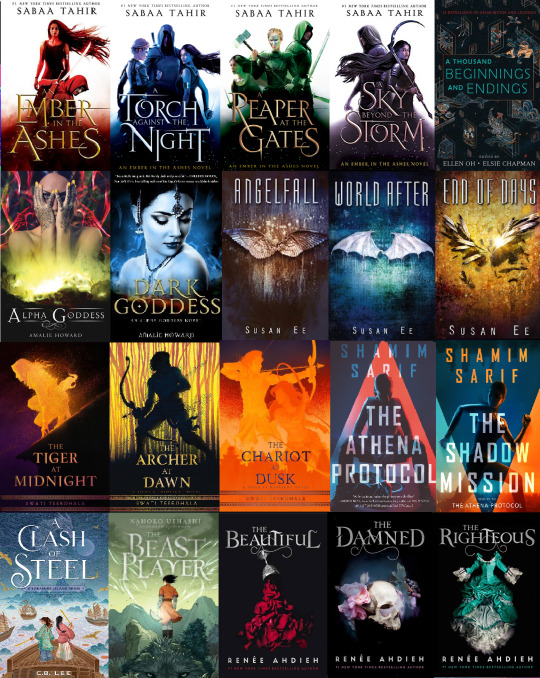
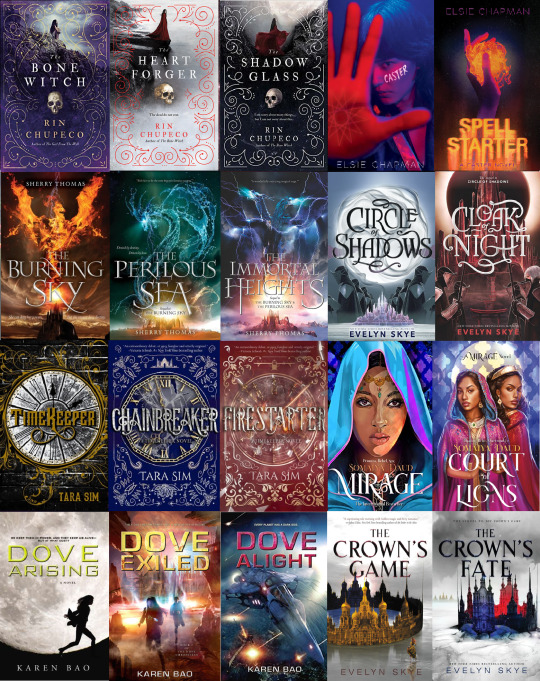
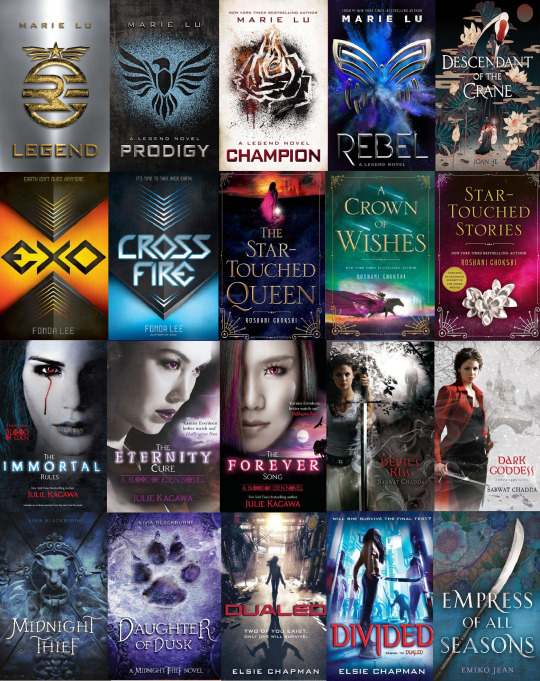



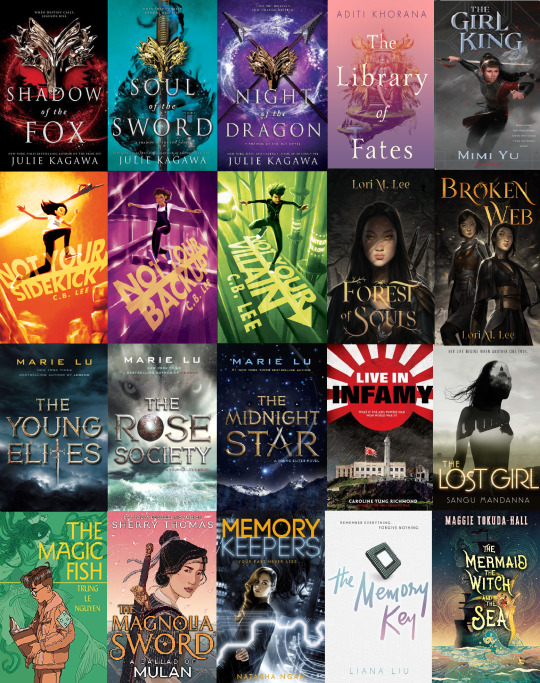
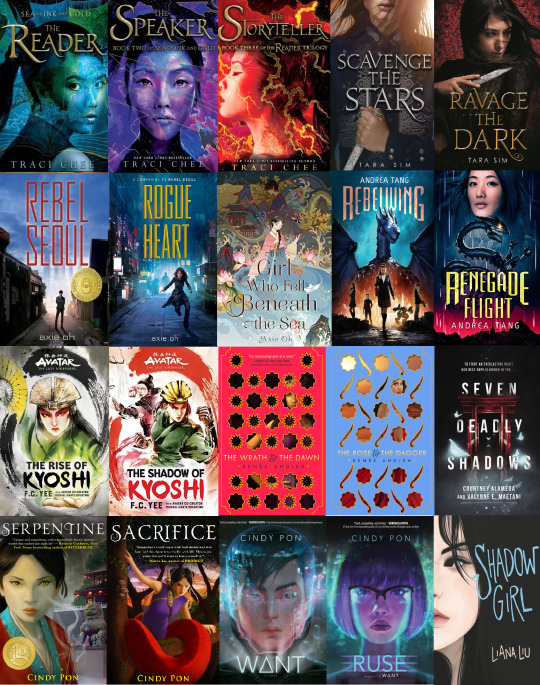


YA SFF Books by Asian Authors
Ash by Malinda Lo: In this variation on the Cinderella story, Ash grows up believing in the fairy realm that the king and his philosophers have sought to suppress, until one day she must choose between a handsome fairy cursed to love her and the King’s Huntress whom she loves.
Along the Indigo by Elsie Chapman: Marsden yearns to take her sister and escape Glory, a town famous for seedy businesses, but her friendship with Jude yields secrets that may chain them to the Indigo River forever.
Alpha Goddess by Amalie Howard: In this sci-fi retelling of Ramayana, Sera is a Hindu goddess incarnate and must battle between her good and evil sides in order to save the world from becoming hell on earth.
Angelfall (Penryn & the End of Days #1) by Susan Ee: It's been six weeks since angels of the apocalypse descended to demolish the modern world. When warrior angels fly away with a helpless little girl, her 17-year-old sister Penryn will do anything to get her back. Anything, including making a deal with an enemy angel, Raffe.
The Archer at Dawn (The Tiger at Midnight #2) by Swati Teerdhala: Set in an Indian & Hindu-inspired world, long-held secrets will force Kunal and Esha to reconsider their loyalties—to their country and to each other.
The Athena Protocol by Shamim Sarif: After being fired from the Athena Protocol, an organization of female spies who enact vigilante justice, Jessie Archer investigates a human trafficking case in Belgrade, while her former teammates have been tasked with bringing her down.
Blood of a Thousand Stars (Empress of a Thousand Skies #2) by Rhoda Belleza: Rhee risks her crown to negotiate peace terms with villainous media star Nero, while framed assassin Aly plots revenge and Kara seeks technology that will erase her royal past.
The Bone Witch by Rin Chupeco: Tea’s gift for death magic means that she is a bone witch, a title that makes her feared and ostracized by her community, but when an older bone witch trains her to become an asha - one who can wield elemental magic - Tea will have to overcome her obstacles and make a powerful choice in the face of danger as dark forces approach.
The Bronzed Beasts (The Gilded Wolves #3) by Roshani Chokshi: With only ten days until Laila expires, the crew will face plague pits and deadly masquerades, unearthly songs, and the shining steps of a temple whose powers might offer divinity itself, but at a price they may not be willing to pay.
The Beast Player by Nahoko Uehashi: An epic YA fantasy about a girl with a special power to communicate with magical beasts and the warring kingdom only she can save.
The Beautiful by Renee Ahdieh: In 19th century New Orleans where vampires hide in plain sight, half-Asian Celine Rosseau, a dressmaker from Paris, becomes embroiled in a murder mystery, connected to the glamorous supernatural cohort, known as the Court of Lions, and catching the eye of their mysterious, charismatic leader, Sèbastien Saint Germain.
Broken Web (Shamanborn #2) by Lori M. Lee: With Queen Meilyr bent on destroying the magical kingdoms, Sirscha becomes caught between a war in the east and the Soulless in the west.
The Candle and the Flame by Nafiza Azad: Set in the city of Noor, along the Silk Road which has become a refuge for those of all faiths, Fatima becomes embroiled in a war between two clans of powerful djinn who threaten to destroy her peace in different ways, forcing her to make unlikely alliances to survive.
Caster by Elsie Chapman: In this Chinese-inspired, magical Fight Club, Earth is already at the brink of environmental disaster due to the magic overuse. And 16-year-old spell caster Aza Wu must navigate through an illegal, underground battle magic tournament, while evading local gangs and police scouts to save her family from ruin.
Catalyst by Lydia Kang: Zelia Benten has lost her father, the love of her life, and any future she might have imagined for herself. Now she, her sister, and the band of illegal genetic outcasts they’ve come to call their family are forced to run when the safety of their foster home is compromised.
A Clash of Steel (A Treasure Island Remix) by C.B. Lee: Set in 1820s China, Xiah joins Anh and her motley crew in pursuit of the hidden treasure of the legendary Dragon Fleet.
Chainbreaker (Timekeeper #2) by Tara Sim: In 1876, someone is destroying the clock towers that control India’s time. Teenage mechanics Danny Hart and half-white, half-Indian Daphne Richards as they travel to Agra to investigate a series of clock tower bombings.
The Chariot at Dusk (Tiger at Midnight #3) by Swati Teerdhala: In the final book of this epic fantasy trilogy, the lands’ fate, their people’s livelihoods, and the bond that sustains their world all depend on what Kunal and Esha can offer—to the gods and to each other.
Champion (Legend #3) by Marie Lu: June and Day have sacrificed so much for the people of the Republic--and each other--and now their country is on the brink of a new existence. Just when a peace treaty is imminent, a plague outbreak causes panic in the Colonies, and war threatens the Republic's border cities.
Circle of Shadows by Evelyn Skye: Love, spies, and adventure abound as apprentice warriors Sora and Daemon unravel a complex web of magic and secrets that might tear them—and the entire kingdom—apart forever.
Control by Lydia Kang: In 2150, when genetic manipulation has been outlawed, seventeen-year-old Zelia must rescue her kidnapped sister with the help of a band of outcasts with mutated genes.
Court of Lions (Mirage #2) by Somaiya Daud: After being swept up into the brutal Vathek court, Amani, the ordinary girl forced to serve as the half-Vathek princess Maram’s body double, is desperate to continue helping the rebellion But can she bear to remain separated, forever, from Maram's fiancé, Idris?
Cross Fire (Exo #2) by Fonda Lee: When the peaceful alien-run government withdraws from Earth, it seems that the terrorist group Sapience is going to get the "free" Earth it wanted; but Donovan Reyes, member of the security forces, and once a prisoner of Sapience, realizes that freedom comes with a price.
The Crown’s Game by Evelyn Skye: Vika Andreyeva can summon the snow and turn ash into gold. Nikolai Karimov can see through walls and conjure bridges out of thin air. They are enchanters—the only two in Russia. The Tsar needs a powerful enchanter by his side.And so he initiates the Crown’s Game, an ancient duel of magical skill—the victor becomes the Imperial Enchanter and the Tsar’s most respected adviser. The defeated is sentenced to death.
The Crown’s Fate (The Crown’s Game #2) by Evelyn Skye: Vika struggles with dangers in her new role as the Imperial Enchanter while Pasha faces disputes about his legitimacy and Nikolai considers how far he is willing to go to return to the world.
A Crown of Wishes (Star-Touched Queen #2) by Roshani Chokshi: Gauri, princess of Bharata, has been captured by her kingdom's enemies and faces a future of exile and scorn--she has nothing left to lose. But Vikram, the notoriously cunning prince of a neighboring land, promises her freedom in exchange for her partnership on his team to win the Tournament of Wishes.
The Damned (The Beautiful #2) by Renée Ahdieh: Sébastien Saint Germain is now cursed and forever changed. The price of loving Celine Rousseau was costly. But as Bastien and Celine begin to uncover the danger around them, they learn their love could tear them apart.
Dark Goddess (Alpha Goddess #2) by Amalie Howard: In this Indian-inspired fantasy, a girl who is the avatar of the goddess Lakshmi must work to prevent the apocalypse at the hands of demons.
Dark Goddess (Templar Chronicles #2) by Sarwat Chadda: Billi SanGreal, a teenaged member of the Knights Templar, must prevent a young girl, who is being hunted by werewolves because of the dangerous powers she possesses, from falling into the hands of the ancient Russian witch, Baba Yaga.
Daughter of Dusk (Midnight Thief #2) by Livia Blackburne: After learning the truth about her bloodlines, Kyra can’t help but feel like a monster. As tensions rise within Forge’s Council, and a vicious Demon Rider attacks continue in surrounding villages, Kyra knows she must do something to save her city.
Descendant of the Crane by Joan He: In this Chinese-inspired fantasy, Princess Hesina of Yan is thrust into power when her beloved father is murdered, and she’s determined to find his killer–whatever the cost.
The Devil’s Kiss (Templar Chronicles #1) by Sarwat Chadda: 15-year-old Billi SanGreal has grown up knowing that being a member of the Knights Templar puts her in danger, but if she is to save London from catastrophe she must make sacrifices greater than she imagined.
The Devil’s Thief (The Last Magician #2) by Lisa Maxwell: Esta and Harte set off on a cross-country chase through time to steal back the elemental stones they need to save the future of magic.
Divided (Dualed #2) by Elsie Chapman: When the Board goes after West Grayer for refusing to kill her next target, West must uncover the truth of the past to survive.
Dove Arising by Karen Bao: On a lunar colony, 15-old Phaet Theta does the unthinkable and joins the Militia when her mother is imprisoned by the Moon's oppressive government.
Dove Exiled (Dove Chronicles #2) by Karen Bao: Phaet’s past catches up with her when the Lunar Bases attack the community and reveal that Phaet is a fugitive. She’s torn between staying on Earth with Wes—whom she’s just discovered her feelings for—and stowing away on a Moon-bound ship to rescue her siblings.
Dove Alight (Dove Chronicles #3) by Karen Bao: Shy, introverted Phaet Theta has gone from being a top student to an interplanetary fugitive to the reluctant but fierce leader of a revolution. But as the death tolls rise, the cost of the war weighs heavily on Phaet. Phaet started this war because she lost someone she loved. Will she have to lose another to end it?
Eclipse the Stars by Maura Milan: Criminal mastermind and unrivaled pilot Ia Ccha and her allies make unpredictable choices as they fight to keep darkness from eclipsing the skies.
An Ember in the Ashes by Sabaa Tahir: Set in a terrifyingly brutal Rome-like world, An Ember in the Ashes is an epic fantasy debut about an orphan, Laia, fighting for her family and a soldier, Elias, fighting for his freedom.
Empress of All Seasons by Emiko Jean: During a once-in-a-generation competition to find the new empress, Mari, who hides a terrible secret, Taro, the prince who would denounce the imperial throne, and Akira, a half-human outcast, will decide the fate of Honoku.
Empress of a Thousand Skies by Rhoda Belleza: Two sisters, Rhee and Kara—sole survivors of a murdered royal lineage - must reunite from opposite ends of the galaxy to salvage what’s left of their family dynasty and save the universe from a greater threat.
End of Days (Penryn & The End of Days #3) by Susan Ee: After a daring escape, Penryn and Raffe are on the run, but a startling revelation about Raffe’s past unleashes dark forces that threaten them all. When the angels release an apocalyptic nightmare onto humans, both sides are set on a path toward war. Forced to pick sides in the fight for control of the earthly realm, Raffe and Penryn must choose: Their own kind, or each other?
The Epic Crush of Genie Lo by F.C. Yee: 15-year-old Genie Lo wonders if she’s qualified enough to gain admission to an Ivy League school, then becomes powerful enough to break through the gates of Heaven with her fists.
The Eternity Cure (Blood of Eden #2) by Julie Kagawa: Cast out of Eden and separated from the boy she dared to love, Allison Sekemoto will follow the call of blood to save her creator, Kanin, from the psychotic vampire Sarren. But when the trail leads to Allie's birthplace in New Covington, what Allie finds there will change the world forever--and possibly end human and vampire existence.
The Ever Cruel Kingdom (The Never Tilting World #2) by Rin Chupeco: To break the cycle of sacrifice, twins Haidee and Odessa need answers that lie beyond the seven gates of the underworld, within the Cruel Kingdom itself. The shadows of the underworld may hunger to tear them apart, but these two sisters are determined to heal their world—together.
Exo by Fonda Lee: For a century now, Earth has been a peaceful colony of an alien race, and Donovan Reyes is a loyal member of the security forces, while his father is the Prime Liaison–but when a routine search and seizure goes bad Donovan finds himself a captive of the human revolutionary group, Sapience, terrorists who seem to prefer war to alien rule, and killing Donovan just might be the incident they are looking for.
Fair Coin by E.C. Myers: When evil versions of himself and best friend Nate appear one day, teenaged Ephraim embarks on a dangerous odyssey through parallel worlds to make things right.
Firestarter (Timekeeper #3) by Tara Sim: Colton, Daphne, and the others must choose between those striving to take down the world’s clock towers so that time can run freely, and terrorists trying to bring back the lost god of time.
Five Dark Fates (Three Dark Crowns #4) by Kendare Blake: In this conclusion to the Three Dark Crowns series, three dark sisters will rise to fight as the secrets of Fennbirn’s history are laid bare. Allegiances will shift. Bonds will be tested, and some broken forever.
Flame in the Mist by Renee Adhieh: The daughter of a prominent samurai, Mariko is promised to Minamoto Raiden. But en route to the imperial city of Inako, Mariko narrowly escapes a bloody ambush by the Black Clan. Dressed as a peasant boy, Mariko sets out to infiltrate the ranks of this gang. But she’s quickly captured and taken to the Black Clan’s secret hideout, where she meets their leader, the rebel ronin Takeda Ranmaru.
For A Muse of Fire by Heidi Heilig: 16-year-old shadow puppeteer Jetta Chantray performs with her family’s traveling troupe, the Ros Nai. But as rebellion seethes and as Jetta meets a young smuggler, she will face truths and decisions that she never imagined—and safety will never seem so far away.
Forest of Souls by Lori M. Lee: Sirscha Ashwyn, while training to become the queen’s next royal spy, discovers she’s a rare and powerful lightwender and is summoned to the realm of the Spider King, where her newly awakened abilities are needed to cull the bloodthirsty Dead Wood.
Forest of a Thousand Lanterns by Julie C. Dao: A reimagining of the evil queen from Snow White based on Asian mythology in which 18-year-old Xifeng must unleash a jealous god on the world and set free the viciousness of her own soul in order to become Empress.
The Forever Song (Blood of Eden #3) by Julie Kagawa: Allie will embrace her cold vampire side to hunt down and end Sarren. But Sarren has left many surprises for Allie and her companions as his trail leads straight to the one place they must protect at any cost -- the last vampire-free zone on Earth.
Fury of the Phoenix (Kingdom of Xia #2) by Cindy Pon: When Ai Ling leaves her home and family to accompany Chen Yong on his quest to find his father, haunted by the ancient evil she thought she had banished to the underworld, she must use her growing supernatural powers to save Chen Yong from the curses that follow her.
Gates of Thread and Stone by Lori M. Lee: A teenage girl must keep her ability to manipulate the threads of time a secret, but when her brother goes missing, she risks getting caught up in a revolution in order to save him.
Gearbreakers by Zoe Hana Mikuta: Eris Shindanai and Sona Steelcrest, two girls on opposite sides of a war fought with Windups, giant mechanizes weapons, discover they’re fighting for a common purpose–and falling for each other.
The Gilded Wolves by Roshani Chokshi: Paris, 1889: Treasure-hunter and wealthy hotelier, Séverin Montagnet-Alarie gets the chance of a lifetime when the all-powerful society, the Order of Babel, seeks him out for help in exchange for a priceless treasure: his true inheritance.
The Girl From Everywhere by Heidi Heilig: From modern-day New York City to nineteenth-century Hawaii to places of myth and legend, 16-year-old Nix has sailed across the globe and through centuries aboard her time-traveling father’s ship. But when he gambles with her very existence, it all may be about to end.
The Girl From the Well by Rin Chupeco: Okiku has wandered the world for centuries, but when she meets Tark she knows the moody teen with the series of intricate tattoos is not a monster and needs to be freed from the demonic malevolence that clings to him.
The Girl King by Mimi Yu: Sisters Lu and Min become unwitting rivals in a war to claim the title of Emperor.
Girl, Serpent, Thorn by Melissa Bashardoust: As the day of her twin brother’s wedding approaches, Princess Soraya must decide if she’s willing to step outside of the shadows for the first time.
Girls of Paper and Fire by Natasha Ngan: When Lei, seventeen, is stolen from her home to become one of nine Paper Girls, the Demon King's concubines, she proves to be more fire than paper.
Girls of Storm and Shadow (Girls of Paper and Fire #2) by Natasha Ngan: After escaping the Hidden Palace, Lei and her warrior love Wren must travel the kingdom to gain support from the far-flung rebel clans.
Girls of Fate and Fury (Girls of Paper and Fire #3) by Natasha Ngan: The last Lei saw of the girl she loved, Wren, was fighting an army of soldiers in a furious battle to the death. With the two girls torn apart and each in terrorizing peril, will they find each other again or have their destinies diverged forever.
The Girl Who Fell Beneath the Sea by Axie Oh: A feminist retelling of the Korean folktale The Tale of Shim Cheong, set in a town where every year a girl is sacrificed to the sea to stop torrential rains, but when a brave teen girl dives in herself to protect a loved one, she discovers a spirit kingdom in need of saving.
The Great Destroyers by Caroline Tung Richmond: set in alt-history, 1960s America where WWI & WII were fought with giant mechs, biracial Chinese American teen Jo Linden is Team USA’s most unlikely pick in the annual Pax Games, an Olympic-style competition that pits mecha pilots against each other.
The Heartforger (Bone Witch #2) by Rin Chupeco: With a thirst for vengeance, a band of terrifying daeva at her command, and her resurrected lover Kalen by her side, dark asha Tea is ready to face her adversaries.
A House of Rage and Sorrow (Celestial Trilogy #2) by Sangu Mandanna: As gods, beasts, and kingdoms choose sides, Alexi seeks out a weapon more devastating than even Titania. The House of Rey is at war. And the entire galaxy will bleed before the end.
Huntress by Malinda Lo: 17-year-olds Kaede and Taisin are called to go on a dangerous and unprecedented journey to Tanlili, the city of the Fairy Queen, in an effort to restore the balance of nature in the human world.
Ignite the Stars by Maura Milan: When outlaw Ia Ccha is captured by the Olympus Commonwealth and revealed to be a 16-year-old girl, they force her to serve them by joining the Commonwealth's military academy where new acquaintances cause Ia to question her own alliances.
The Immortal Rules (Blood of Eden #1) by Julie Kagawa: Allison Sekemoto survives in the Fringe, the outermost circle of a vampire city, until she too becomes an immortal vampire. Forced to flee into the unknown, outside her city walls, she joins a ragged band of humans who are seeking a legend -- a possible cure to the disease that killed off most of humankind and created the rabids, the mindless creatures who threaten humans and vampires alike.
Inferno (Talon #5) by Julie Kagawa: Ember Hill has learned a shocking truth about herself: she is the blood of the Elder Wyrm, the ancient dragon who leads Talon and who is on the verge of world domination. With the stakes rising and the Elder Wyrm declaring war, time is running out for the rogues and any dragon not allied with Talon. The final battle approaches. And if Talon is victorious, the world will burn.
The Infinity Courts by Akemi Dawn Bowman: Japanese American teen Nami Miyamoto finds herself in a limitless world where the human consciousness goes after death, where she battles an AI entity posing as a queen that has hacked its way into the afterlife.
Isle of Blood and Stone by Makiia Lucier: Mysterious maps from opposite ends of the sea cast doubt on the whereabouts of two princes, presumed dead.
Jade Fire Gold by June C.L. Tan: A debut fantasy inspired by Chinese mythology, in which peasant girl Anh, cursed with the power to steal souls enters a tenuous alliance with exiled prince Altan, bent on taking back the dragon throne, and save the empire from a cult of dangerous priests.
Journey to the Heart of the Abyss (Light in the Abyss #2) by London Shah: Leyla McQueen has finally reunited with her father after breaking him out of Broadmoor, the illegal government prison—but his freedom comes at a terrible cost. As Leyla celebrates his return, she must grapple with the pain of losing Ari. Now labeled the nation’s number one enemy, Leyla must risk illegal travel through unchartered waters for the truth behind her father’s arrest.
Hunted by the Sky by Tanaz Bhathena: Set in a world inspired by medieval India, the story tells of a girl, Gul, with a star-shaped birthmark who is prophesied to be the downfall of a tyrant king, the warrior women who come to her aid, and the boy she falls in love with.
The Keeper of the Night by Kylie Lee Baker: set in 1890s Japan, half-British reaper, half-Japanese Shinigami Ren Scarborough flees London and enters the Japanese underworld under the service of Izanami, the goddess of death.
King (Dragon King Chronicles #3) by Ellen Oh: Girl warrior, demon slayer, Tiger spirit of the Yellow Eyes - Kira is ready for her final quest! She must save her cousin, the boy fated to be the future king, uncover the third lost treasure, and face innumerable enemies in order to fulfill the famed prophecy.
A Kingdom for the Stage (For A Muse of Fire #2) by Heidi Heilig: The rebels are eager to use Le Trépas’s and necromancer Jetta’s combined magic against the invading colonists. Soon Jetta will face the choice between saving all of Chakrana or becoming like her father, and she isn’t sure which she’ll choose.
Kingdom of the Blazing Phoenix (Rise of the Empress #2) by Julie C. Dao: Princess Jade has grown up in exile while her stepmother, the ruthless Xifeng, rules Feng Lu. Ready to reclaim her place, Jade embarks on a quest to raise the Dragon Lords and defeat Xifeng and the Serpent God once and for all.
Legend by Marie Lu: In a dark future, when North America has split into two warring nations, 15-year-olds Day, a famous criminal, and prodigy June, the brilliant soldier hired to capture him, discover that they have a common enemy.
Legion (Talon #4) by Julie Kagawa: The legions are about to be unleashed, and no human, rogue dragon or former dragon slayer can stand against the coming horde in book 4 out of the Talon series.
The Library of Fates by Aditi Khorana: Amrita must unravel the mysteries of her past to save her kingdom, but in doing so, she herself might come unraveled.
The Light At the Bottom of the World by London Shah: Set in a future where the Earth is underwater, Leyla McQueen must navigate the treacherous abyss to find her missing father, but discovers a world drowning in lies.
Live in Infamy by Caroline Tung Richmond: 80 years since the Axis won World War II, and America was divided between the victors: the Nazis in the East and Imperial Japan in the West; but now resistance is growing in the Eastern territories and 16-year-old Chinese American Ren Cabot finds himself drawn into a resistance group.
The Lost Girl by Sangu Mandanna: 15-year-old Eva is the clone of a girl living far, far away on another continent--and when this 'other' dies, Eva must step in and take over her life.
The Infinite (Gates of Thread and Stone #2) by Lori M. Lee: Kai always believed the only danger to the city came from within. Now, with a rebel force threatening the fragile government, the walls have become more of a prison than ever. To make matters worse, as Avan explores his new identity as an Infinite, Kai struggles to remind him what it means to be human.
Iron Widow by Xiran Jay Zhao: blending Chinese history and mecha science, Wu Zetian offers herself up as a concubine-pilot to assassinate the ace male pilot responsible for her sister’s death. Features a poly F/M/M main romance.
The Iron Will of Genie Lo (Epic Crush of Genie Lo #2) by F.C. Yee: Along with a few other contenders for the throne, heaven-appointed guardian Genie and her friends embark on a Heavenly quest to an in-between world.
The Magic Fish by Trung Le Nguyen: An intergenerational story of a mother and son struggling to relate to each other—the mother an immigrant to America who wants to make a home for her family in an unfamiliar country; the son Tiế trying to figure out the best way to come out to his parents. Through telling each other fairy tales, they’re able to find common ground.
The Magnolia Sword: A Ballad of Mulan by Sherry Thomas: When her ailing father is conscripted to fight invaders from the north, Mulan dresses as a man to take his place in the army, but an old enemy and an attraction for her troop's commander complicate her mission.
The Memory Keepers by Natasha Ngan: Seven is a thief with a difference - he steals downloadable memories from banks and memoriums to sell onto London’s black market. But one night, as Seven is breaking into a private memorium in a wealthy part of London, he is caught in the act by one of its residents; Alba, the teenage daughter of London’s most famous criminal prosecutor.
The Memory Key by Liana Liu: In the not-so-distant future, everyone is implanted with a memory key to stave off a virulent form of Alzeimer's. Lora Mint fears her memories of her deceased mother are fading, but when her memory key is damaged she has perfect recall--of everything-- which brings her mother's memory vividly back--but may also drive Lora mad.
The Mermaid, The Witch, and The Sea by Maggie Tokuda-Hall: A desperate orphan turned pirate, Flora, and a rebellious imperial daughter, Lady Evelyn Hasegawa, find a connection on the high seas abroad the Dove, in a world divided by colonialism and threaded with magic.
The Midnight Star (Young Elites #3) by Marie Lu: Adelina is forced to revisit old wounds when a new danger appears, putting not only Adelina at risk, but every Elite. In order to save herself and preserve her empire, Adelina and her Roses must join the Daggers on a perilous quest—though this uneasy alliance may prove to be the real danger.
The Midnight Thief by Livia Blackburne: Kyra, a highly skilled 17-year-old thief, joins a guild of assassins with questionable motives. Tristam, a young knight, fights against the vicious Demon Riders that are ravaging the city.
Mirage by Somaiya Daud: In a star system dominated by the brutal Vathek empire, 18-year-old Amani is forced to work as a body double for the princess who is hated by her conquered people.
The Never Tilting World by Rin Chupeco: In a world ruled by goddesses that has been split in two—one half existing in perpetual scorching Day, the other in freezing Night—twins separated at birth Odessa and Haidee embark on a quest across the great divide and rule a reunited world.
Mooncakes by Wendy Xu & Suzanne Walker: Teen witch Nova Huang runs into her childhood crush, Tam Lang, battling a horse demon in the woods. Pursued by dark forces eager to claim the magic of wolves and out of options, Tam turns to Nova for help.
Moribito, Guardian of the Spirit by Nahoko Uehashi: The wandering warrior Balsa is hired to protect Prince Chagum from both a mysterious monster and the prince's father, the Mikado.
Moribito II, Guardian of the Darkness by Nahoko Uehashi: The wandering female bodyguard Balsa returns to her native country of Kanbal, where she uncovers a conspiracy to frame her mentor and herself.
Night of the Dragon (Shadow of the Fox #3) by Julie Kagawa: As darkness rises and chaos reigns, fierce kitsune shapeshifter Yumeko and her shadowy protector Kage Tatsumi, will face down the greatest evil of all.
Not Your Sidekick by C.B. Lee: Resigned to a life without superpowers in a world full of them, Jess takes a paid internship where she helps a heinous supervillain and works with her longtime crush Abby, but stumbles on a massive plot.
Not Your Villain (Sidekick Squad #2) by C.B. Lee: After discovering a massive cover-up by the Heroes’ League of Heroes, shapeshifter Bells Broussard and his friends Jess, Emma, and Abby set off on a secret mission to find the Resistance.
Not Your Backup by C.B. Lee (Sidekick Squad #3): As the Resistance moves to challenge the corrupt League of Heroes, Emma Robledo realizes where her place is in this fight: at the front.
On This Unworthy Scaffold (Shadow Players #3) by Heidi Heilig: Jetta’s home is spiraling into civil war.Le Trépas—the deadly necromancer—has used his blood magic to wrest control of the country. Meanwhile, Jetta’s love interest, brother, and friend are intent on infiltrating the palace to stop the Boy King and find Le Trépas to put an end to the unleashed chaos.
The Only Thing to Fear by Caroline Tung Richmond: After 70 years since Hitler's armies won the war, 16-year-old Zara St. James lives in the Shenandoah hills, part of the Eastern American Territories, under the rule of the Nazis--but a resistance movement is growing.
The Ones We’re Meant to Find by Joan He: In a near future when life is harsh outside of Earth’s last unpolluted place, Cee tries to leave an abandoned island while her sister, STEM prodigy Kasey Mizuhara, seeks escape from the science and home she once trusted.
One Dark Throne (Three Dark Crowns #2) by Kendare Blake: Preparing for the queens' sixteenth birthday celebration and navigating the fallout of the Quickening, sisters Arsinoe, Katharine, and Mirabella reassess their strategic paths to the throne using new understandings of their powers and destinies.
Our Violent Ends (These Violent Delights #2) by Chloe Gong: In 1927, Shanghai tethers on the edge of revolution. After sacrificing her relationship with Roma to protect him from the blood feud, Juliette has been a girl on the warpath. Then a new monstrous danger emerges in the city, and while secrets keep them apart, Juliette must secure Roma’s cooperation if they are to end this threat.
Prodigy (Legend #2) by Marie Lu: June and Day make their way to Las Vegas where they join the rebel Patriot group and become involved in an assassination plot against the Elector in hopes of saving the Republic.
Quantum Coin (Fair Coin #2) by E.C. Myers: Ephraim, Jena, and Zoe embark on a mission across multiple worlds to learn what's going wrong and how to stop it. They will have to draw on every resource available and trust in alternate versions of themselves and their friends, before it's too late for all of them.
Ravage the Dark (Scavenge the Stars #2) by Tara Sim: After escaping the city of Moray, Amaya and Cayo head to the port city of Baleine to find the mysterious Benefactor and put a stop to the counterfeit currency that is spreading Ash Fever throughout the kingdoms.
The Reader by Traci Chee: Set in a world where reading is unheard-of, Sefia makes use of a mysterious object to track down who kidnapped her aunt Nin and what really happened the night her father was murdered.
A Reaper At the Gates (An Ember in the Ashes #3) by Sabaa Tahir: Beyond the Empire and within it, the threat of war looms ever larger as the Blood Shrike, Helene Aquilla, Laia of Serra, and Elias Veturius all face increasing dangers.
Rebel (Legend #4) by Marie Lu: Brothers Eden and Daniel Wing struggle to accept who they’ve each become since their time in the Republic, but a new danger creeps into the distance that’s grown between them. Eden soon finds himself drawn so far into Ross City’s dark side, even his legendary brother can’t save him. At least not on his own.
Rebelwing by Andrea Tang: At a prestigious prep school, scholastic student Prudence Wu, who smuggles censored media in a futuristic North America divided by culture wars and becomes an unlikely revolutionary, after being imprinted by Rebelwing, a sentient cybernetic dragon.
Renegade Flight (Rebelwing #2) by Andrea Tang: Pilot-in-training Viola Park, a probationary student at GAN Academy, enters a mech combat tournament that becomes a fight for the future of Peacekeepers everywhere.
Rising Like a Storm (The Wrath of Ambar #2) by Tanaz Bhathena: Gul and Cavas must unite their magical forces―and hold onto their growing romance―to save their kingdom from tyranny.
The Righteous (The Beautiful #3) by Renée Ahdieh: Pippa Montrose is tired of losing everything she loves. When her best friend Celine disappears under mysterious circumstances, Pippa resolves to find her, even if the journey takes her into the dangerous world of the fae, where she might find more than she bargained for in the charismatic Arjun Desai.
The Rise of Kyoshi by F.C. Yee: The never-before-told backstory of Avatar Kyoshi, from a girl of humble origins to the merciless pursuer of justice who is still feared and admired centuries after she became the Avatar.
Rogue (Talon #2) by Julie Kagawa: Unable to forget the human boy who saved her from a Talon assassin, Ember is determined to save him from execution with the help of rebel dragon Cobalt and his crew of rogues.
Rogue Heart (Rebel Seoul #2) by Axie Oh: Two years after the Battle of Neo Seoul, telepath Ama must use her telepathic abilities to infiltrate the base of the Alliance’s new war commander, Alex Kim, her first love who betrayed her.
The Rose and the Dagger (Wrath and the Dawn #2) by Renee Adhieh: Unsure who to trust, Shahrzad takes matters into her own hands to try and break the curse and reunite with her one true love.
The Rose Society (Young Elites #2) by Marie Lu: Adelina Amouteru’s heart has suffered at the hands of both family and friends, turning her down the bitter path of revenge. Now known and feared as the White Wolf, she and her sister flee Kenettra to find other Young Elites in the hopes of building her own army of allies. Her goal: to strike down the Inquisition Axis.
Ruse (Want #2) by Cindy Pon: In near-future Shanghai where society is divided between the fabulously wealthy business elite and the masses they exploit, Jason Zhou must play a dangerous cat and mouse game with the ruthless CEO of an all powerful corporation which has an ever-growing choke hold on the polluted metropolis.
Scavenge the Stars by Tara Sim: In the city-state of Moray, Amaya, orphaned by a powerful merchant’s greed and condemned to seven years aboard a debtor’s ship, returns to seek revenge only to encounter the merchant’s son in this gender-swapped retelling of The Count of Monte Cristo.
Serpentine by Cindy Pon: Although 16-year-old Skybright feels lucky to be the handmaid and companion to the daughter of a wealthy family, she is hiding a secret that threatens to destroy her position and her closest relationships.
Sacrifice (Serpertine #2) by Cindy Pon: When Zhen Ni discovers that her new husband, the strange and brutish Master Hou, may not be all he seems, Skybright and Stone must travel through the terrifying underworld to save her.
Seven Deadly Shadows by Courtney Alameda & Valynne Maetani: Set in contemporary Japan, Shinto temple priestess Kira Fujikawa, must seek the aid of seven ruthless shinigami, in order to protect Kyoto from an ancient evil.
Shatter the Sky by Rebecca Kim Wells: Maren, desperate to save her kidnapped girlfriend Kaia, plans to steal one of the emperor’s dragons and storm the Aurati stronghold, but her success depends on becoming an apprentice to the mysterious dragon trainer, which proves to be a dangerous venture.
Talon by Julie Kagawa: In a world in which near-extinct dragons pass as humans to grow their numbers secretly, siblings Ember and Dante Hill prepare for destined positions in the world of Talon only to be hunted by a dragon-slaying soldier.
The Ship Beyond Time (Girl From Everywhere #2) by Heidi Heilig: Nix has escaped her past, but when the person she loves most is at risk, even the daughter of a time traveler may not be able to outrun her fate—no matter where she goes.
The Shadow Mission (The Athena Protocol #2) by Shamim Sharif: Jessie Archer faced down death to prove her dedication to Athena, the elite organization of female spies she works for. Now she’s back on the team, in time to head to Pakistan to take down the man whose actions spurred Athena’s founders to create the secretive squad.
The Shadow of Kyoshi (Kyoshi #2) by F.C. Yee: Kyoshi’s place as the true Avatar has finally been cemented. With her mentors gone, Kyoshi voyages across the Four Nations, struggling to keep the peace. But while her reputation grows, a mysterious threat emerges from the Spirit World. To stop it, Kyoshi, Rangi, and their reluctant allies must join forces.
Shadow of the Fox by Julie Kagawa: Demons have burned the temple Yumeko was raised in to the ground, killing everyone within, including the master who trained her to both use and hide her kitsune shapeshifting powers. Yumeko escapes with the temple’s greatest treasure—one part of the ancient scroll. Fate thrusts her into the path of a mysterious samurai, Kage Tatsumi of the Shadow Clan. Yumeko knows he seeks what she has…and is under orders to kill anything and anyone who stands between him and the scroll.
Shadow Girl by Liana Liu: When Mei arrives at the beautiful home on Arrow Island, she can't help feeling relieved. She's happy to spend the summer tutoring a rich man's daughter if it means a break from her normal life. Yet she can't shake her fear that there is danger lurking in the shadows of this beautiful house, a darkness that could destroy the family inside and out...and Mei along with them.
Shadowsong (Wintersong #2) by S. Jae-Jones: Liesl is working toward furthering both her brother’s and her own musical careers. But when troubling signs arise that the barrier between worlds is crumbling, Liesl must return to the Underground to unravel the mystery of life, death, and the Goblin King—who he was, who he is, and who he will be.
Smoke in the Sun (A Flame in the Mist #2) by Renee Ahdieh: After Okami is captured in the Jukai forest, Mariko has no choice—to rescue him, she tricks her brother, Kenshin, and betrothed, Raiden, into thinking she was being held by the Black Clan against her will. But each secret Mariko unfurls gives way to the next, ensnaring her and Okami in a political scheme that threatens their honor, their love and very the safety of the empire.
Sisters of the Snake by Sasha & Sarena Nanua: an Indian-inspired fantasy where twins separated at birth—one now a princess, the other a street thief— must switch places in a bid to stop a catastrophic war that threatens to tear their kingdom apart.
Silver Phoenix (Kingdom of Xia #1) by Cindy Pon: With her father long overdue from his journey and a lecherous merchant blackmailing her into marriage, 17-year-old Ai Ling becomes aware of a strange power within her as she goes in search of her parent.
The Silvered Serpents (The Gilded Wolves #2) by Roshani Chokshi: Séverin and his team members might have successfully thwarted the Fallen House, but at a terrible cost. Desperate to make amends, Séverin pursues a dangerous lead to find a long lost artifact rumored to grant its possessor the power of God. Their hunt lures them far from Paris, and into icy heart of Russia.
Six Crimson Cranes by Elizabeth Lim: The Wild Swans meets East Asian fantasy where an exiled princess, Shiori, must unweave the curse that turned her brothers into cranes, assisted by her spurned betrothed, a mercurial dragon, and a paper bird brought to life by her own magic.
A Sky Beyond the Storm (An Ember in the Ashes #4) by Sabaa Tahir: Laia of Serra is now allied with the Blood Shrike, Helen Aquilla. Determined to stop the approaching apocalypse, she throws herself into the destruction of the Nightbringer. In the process, she awakens an ancient power that could lead her to victory–or to an unimaginable doom.
Skyhunter by Marie Lu: Robbed of her voice and home, Talin Kanami knows firsthand the brutality of the Federation. Their cruelty forced her and her mother to seek asylum in Mara. When a mysterious prisoner is brought from the front, Talin senses there’s more to him than meets the eye.
The Shadow Glass (Bone Witch #3) by Rin Chupeco: Bone witch Tea’s dark magic eats away at her, but she must save the one she loves most, even while her life—and the kingdoms—are on the brink of destruction.
Song of the Abyss (Towers of Wind #2) by Makiia Lucier: When menacing raiders attack her ship, navigator Reyna must use every resource at her disposal, including placing her trust in a handsome prince from a rival kingdom.
Song of the Crimson Flower by Julie C. Dao: After cruelly rejecting Bao, the poor physician’s apprentice who loves her, Lan, a wealthy nobleman’s daughter, regrets her actions. After learning that Bao’s soul has been trapped inside a flute by a witch, Lan vows to make amends and help break the spell.
Soul of the Sword (Shadow of the Fox #2) by Julie Kagawa: As the paths of Yumeko and the possessed Tatsumi cross once again, the entire empire will be thrown into chaos.
A Spark of White Fire by Sangu Mandanna: In this sci-fi retelling of the Mahabrahata, Esmae learns that the King of Wychstar is offering the unbeatable warship Titania to the winner of his competition and she sees her chance to return home and help her brother win back his kingdom.
The Speaker (Sea of Ink and Gold #2) by Traci Chee: Having barely escaped the clutches of the Guard, Sefia and Archer are back on the run, slipping into the safety of the forest to tend to their wounds and plan their next move.
Spin the Dawn by Elizabeth Lim: 17-year-old Maia Tamarin poses as a boy to compete for the role of imperial tailor, and embarks on an impossible journey to sew three magic dresses, from the sun, the moon, and the stars, with help from the mysterious court magician, Edan.
Spell Starter (Caster #2) by Elsie Chapman: Yes, Aza Wu now has magic back, but now she’s in the employ of the gang leader, St. Willow. Who soon decides that having Aza as a fighter is much more lucrative than as a fixer.
Star Daughter by Shveta Thakrar: Inspired by Hindu mythology, half-mortal, half-star Sheetal enters a celestial competition to save her human father’s life.
The Star-Touched Queen by Roshani Chokshi: Treated with scorn and fear in her father's kingdom because of a formidable horoscope, 16-year-old Maya commits herself to her education only to land in an arranged marriage that culminates in her sudden elevation to the throne, a situation that is threatened by dark secrets and Otherworldly magic.
Star-Touched Stories by Roshani Choski:Three lush and adventurous stories in the Star-Touched world.
Steelstriker (Skyhunter #2) by Marie Lu: After the fall of Mara, and with the fate of a broken world hanging in the balance, Talin and Red must reunite the Strikers and find their way back to one another.
Storm the Earth (Shatter the Sky #2) by Rebecca Kim Wells: Maren and her girlfriend Kaia set out to rescue Sev in Zafed, and free the dragons from the corrupt emperor.
The Storyteller (Sea of Ink and Gold #3) by Traci Chee: Sefia is determined to keep Archer out of the Guard’s clutches and their plans for war between the Five Kingdoms. As Sefia and Archer watch Kelanna start to crumble to the Guard’s will, they will have to choose between their love and joining a war that just might tear them apart.
Stronger Than A Bronze Dragon by Mary Fan: In this steampunk fantasy set in Qing dynasty-inspired China, warrior girl Anlei teams up with a thief to save her village from shadow spirits, but after arriving at the Courts of Hell, a discovery challenges everything they know about who the real enemy is.
The Suffering (Girl From the Well #2) by Rin Chupeco: When an old friend disappears in Aokigahara, Japan's infamous 'suicide forest,' Tark and the ghostly Okiku must resolve their differences and return to find her. In a strange village inside Aokigahara, old ghosts and an ancient evil lie waiting.
These Violent Delights by Chloe Gong: In 1920s Shanghai, starcrossed heirs to rival gangs, Juliette Cai and Roma Montagov, must work together to face a monster that hunts the city streets before the outbreak of the Chinese Civil War.
Three Dark Crowns by Kendare Blake: A fantasy about triplet sisters separated at birth, where one of the sisters will grow up to be queen of their magical island, but in order to ascend to the throne she must hone her magic for a dark purpose: assassinating her other two sisters before they kill her first.
A Thousand Beginnings and Endings edited by Ellen Oh & Elsie Chapman: 15 bestselling and acclaimed authors reimagine the folklore and mythology of East and South Asia in short stories that are by turns enchanting, heartbreaking, romantic, and passionate.
A Thousand Fires by Shannon Price: In modern-day San Francisco where three gangs rule the city streets, half-Filipina teen Valerie Simons enters the Red Bridge Wars to seek vengeance for her younger brother’s death, but soon finds herself torn between old love and new loyalty.
The Tiger at Midnight by Swati Teerdhala: In ancient India, soldier Kunal hunts the “Viper,” rebel girl Esha accused of killing his General, embarking on a dangerous cat and mouse game and where both must decide—loyalty to their old lives or to a love that’s made them dream of new ones.
Timekeeper by Tara Sim: set in an alternate Victorian era where clock towers control time, about a teen clock mechanic who is assigned to repair a damaged tower and finds himself falling in forbidden love with the boy he mistakes for his apprentice, but is actually the tower’s clock spirit, and whose life is threatened by a mysterious attacker planting bombs in clock towers across England.
A Torch Against the Night (An Ember in the Ashes #2) by Sabaa Tahir: Laia and Elias fight their way north to liberate Laia’s brother from the horrors of Kauf Prison. Hunted by Empire soldiers, manipulated by the Commandant, and haunted by their pasts, Laia and Elias must outfox their enemies and confront the treacherousness of their own hearts.
Two Dark Reigns (Three Dark Crowns #3) by Kendare Blake: A victorious Katharine sits on the throne, Mirabella and Arsinoe are in hiding, and an unexpected renegade is about to wage a war of her own. The crown has been won, but these queens are far from done.
Unravel the Dusk (The Blood of Stars #2) by Elizabeth Lim: With a war brewing, master tailor Maia Tamarin will stop at nothing to find her love Edan, protect her family, and bring lasting peace to her country.
Vicious Spirits (Gumiho #2) by Kat Cho: With the support of Somin and Junu, Miyoung and Jihoon might just have a shot at normalcy. But Miyoung is getting sicker by the day and her friends don’t know how to save her. With few options remaining, Junu has an idea but it might require the ultimate sacrifice and, let’s be honest, Junu isn’t known for his “generosity.”
Want by Cindy Pon: Set in a teeming, pollution choked Taipei which follows a group of teens living on the seedy fringes of a highly divided society that works only for the elite as they decide to risk everything to take down the powerful company which controls the city.
Warcross by Marie Lu: When teenage coder Emika Chen hacks her way into the opening tournament of the Warcross Championships, she glitches herself into the game as well as a sinister plot with major consequences for the entire Warcross empire.
Warrior (Dragon King Chronicles #2) by Ellen Oh: Kira, the yellow-eyed demon slayer of Hansong, continues her quest to find the lost treasures of the dragon king's prophecy, save her cousin, the prince, unite her kingdom, and defeat the demon lord
We Hunt the Flame (Sands of Arawiya #1) by Hafsah Faizal: In a world inspired by ancient Arabia, 17-year-old huntress Zafira must disguise herself as a man to seek a lost artifact that could return magic to her cursed world.
We Free the Stars (Sands of Arawiya #2) by Hafsah Faizal: When Zafria, the Hunter, and Nasir, the Prince of Death both embark on a quest to uncover a lost magic artifact, they encounter an ancient evil long thought destroyed - and discover that the prize they seek may be even more dangerous this time.
Where Dreams Descend by Janella Angeles: Showgirl Kallia, haunted by a dark past, must compete in a magician’s competition in order to secure her ambition and freedom from the handsome, enigmatic keeper of the club, Jack, even as mysterious accidents seem to plague her every move, while crossing paths with another talented magician, Demarco.
When Night Breaks (Kingdom of Hearts #2) by Janella Angeles: The competition has come to a disastrous end, and Daron Demarco’s fall from grace is now front page news. But little matters to him beyond Kallia, the contestant he fell for. With time running out, Kallia must embrace her role in a darker destiny.
Wicked Fox by Kat Cho: After 18-year-old Miyoung Gu, a nine-tailed fox surviving in modern-day Seoul by eating the souls of evil men, kills a murderous goblin to save Jihoon, she is forced to choose between her immortal life and his.
Wildcard (Warcross #2) by Marie Lu: Emika Chen barely made it out of the Warcross Championships alive. Knowing the truth behind Hideo's new NeuroLink algorithm, she is determined to put a stop to his plans.
The Wild Ones by Nafiza Azad: A a multi-perspective feminist narrative about a fierce band of magic-wielding girls—the Wild Ones—who have collectively survived unspeakable things, and together are determined to save other girls from the cruelties and tragedies they’ve had to endure in their own past lives.
Wintersong by S. Jae-Jones: After her sister is kidnapped by the Goblin King, Liesl journeys to the Underground and is faced with an impossible decision when she finds herself captivated by the strange world and its mysterious ruler.
Wicked As You Wish by Rin Chupeco: A girl descended from Filipina mythological heroine Maria Makiling, finds herself caught up in a war between two fairy tale kingdoms, where the fate of Avalon is at stake.
Windborn by Mary Fan: With magicians hot on their trail, air nymph Kiri and magician’s apprentice Darien embark on a treacherous journey through dangerous lands to freedom.
World After (Penryn & The End of Days #2) by Susan Ee: Penryn's search for her kidnapped sister, Paige, leads her into the heart of the angels' secret plans, while Raffe must choose between reclaiming his wings--and his role as the angels' leader--or helping Penryn survive.
The Wrath and the Dawn by Renee Adhieh: In this reimagining of The Arabian Nights, Shahrzad plans to avenge the death of her dearest friend by volunteering to marry the murderous boy-king of Khorasan but discovers not all is as it seems within the palace.
Zeroboxer by Fonda Lee: As 17-year-old Carr 'the Raptor' Luka rises to fame in the weightless combat sport of zeroboxing, he learns a devastating secret that jeopardizes not only his future in the sport, but interplanetary relations.
254 notes
·
View notes
Note
Did Lafayette own slaves?
Hello! Yes, the Marquis de La Fayette owned enslaved people – close to seventy people actually. He did own them in an attempt to promote the abolishing of slavery. That sounds like an awful contradiction at first so allow me to elaborate. La Fayette believed passionately that slavery was wrong and that something needed to be done. This opinion was in large parts formed during the American Revolution. It was not only the first time that he was so strongly exposed to the system of slavery but he was also confused by the contradiction America presented. A people fighting for their freedom and independence, writing such lofty words as “We hold these truths to be self-evident, that all men are created equal, that they are endowed by their Creator with certain unalienable Rights, that among these are Life, Liberty and the pursuit of Happiness.“ – yet the very same people kept their fellow man in bondage. But slavery was not an exclusively American problem – far from it. La Fayette wanted to show everybody that it was possible to abolish slavery – gradually at least. He wanted to purchase a plantation and a number of enslaved individuals and then teach them everything they needed to know – in his opinion at least, to be freed. He told Washington (and a number of other people) about his idea and tried to enlist his aide. In general, La Fayette often discussed the matter of slavery with Washington, who owned quite a number of enslaved individuals himself, and even tried to convince him of freeing all these men and women. La Fayette hoped that Washington’s greater than life reputation would convince other people to do so as well. Washington’s reputation and great name were also surely among the reasons why La Fayette wanted his help with regard to his plantation-project. He wrote the following in a letter to Washington on February 5, 1783:
„Now, My dear General, that You are Going to Enjoy some Ease and Quiet, Permit me to propose a plan tot you Which Might Become Greatly Beneficial to the Black part of Mankind—Let us Unite in Purchasing a small Estate Where We May try the Experiment to free the Negroes, and Use them only as tenants—Such an Example as Yours Might Render it a General Practice, and if We succeed in America, I Will chearfully devote a part of My time to Render the Method fascionable in the West indias—if it Be a Wild scheme, I Had Rather Be Mad that Way, than to Be thought Wise on the other tack.“
The latter was actually about the peace treaty that effectively ended the Revolutionary War. For the next three years not much was happening – until La Fayette wrote Washington again on July 14, 1785:
„You Remember an idea which I imparted to you three years ago—I am Going to try it in the french Colony of Cayenne—But will write more fully on the Subject in my other letters.“
He wrote again to Washington on February 6, 1786:
„(…) an other Secret I intrust to you, my dear General, is that I Have purchased for Hundred And twenty five thousand French livres a plantation in the Colony of Cayenne and am going to free my Negroes in order to Make that Experiment which you know is My Hobby Horse.“
La Fayette had instructed his attorney to buy property in French Guiana in a letter on June 7, 1785 with the condition that he would “neither sell nor exchange any black“. The 125.000 Livre he paid translate roughly to 1.250.000 modern US Dollar. The plantation was named “La Belle Gabrielle” and was the “home” of just under seventy individuals between the ages of a few months and 59 years (I have sadly never seen a more precise number). The Administer of the plantation, a Monsieur de Geneste, send La Fayette a list with the names, age and descriptions of these people. Here is the first page of his report.
La Belle Gabrielle was a clove and cinnamon plantation and after La Fayette bought the property, he employed the following changes. The people there were paid, given free time and days off and an education. Furthermore the severity of their punishments was toned down to resemble the punishment that any free white labourer would face under similar circumstances. They were however not free to just wander off. When the French Revolution really hit it off in 1789, La Fayette had less and less time to spend on his “hobby horse” as he called it. His wife Adrienne, who was involved from the begin, took over and managed now most of the plantations affairs. Adrienne was a very religious person and the moral and religious education of the people on the plantation was for her of great importance. He corresponded regularly with Miolas Jacquemin, a missionary who lived in a settlement of missionaries close by the plantation. It seems as though he not only reported to her what was happening on the plantation but that he and his fellow missionaries also coordinated the religious education of the people there.
In 1792, when the National Convention called for La Fayette’s arrest and he was captured by the Austrians, his properties were sold, including his plantation. His improvements on the plantations were revoked. In February of 1794 the Convention abolished slavery and French Guiana was actually one of the places that was reached by the new law. In many French colonies things continued like they were despite the new law. Furthermore was French Guiana one of the few places that did not see a lot of violent upheaval during this time – something La Fayette later in life took great comfort in. So yes, La Fayette did own enslaved people at one point in his life.
I hope you have a pleasant day/evening.
#ask me anything#lafayette#marquis de lafayette#general lafayette#george washington#adrienne de noailles#adrienne de lafayette#slavery#american revolution#american history#amrev#french history#french revolution#french guiana#1783#1785#1786#1789#1792#1794
68 notes
·
View notes
Note
Not rly st related, well maybe? 4th of July , but why are US-citizens so in love with their country? They even call themselves Americans when their nation is just one part of the continent, lol. If I were as obsessed with my country people would call me crazy. Oh and my granny is German and I know that many Germans are still scared to even wave their flag cos of past events, and the US isn't rly a nation of peace either. pls dont get me wrong, Im just curious and dont know any US people irl xD
I'm not going to pretend I'm an expert on the matter, but I do have something of an interest in history.
I think the patriotic spirit of Americans is as much a practical matter as it is a symbolic one. In the early Colonial days, citizens were more likely to identify themselves by their colony (i.e. Pennsylvanian or Virginian). They were also still British citizens at the time, and, even during the Revolution, many still stayed loyal to the king. Creating a sense of patriotism and a unified front would be crucial in presenting a realistic challenge to the British Empire. One of the rally flags of the Revolution was the Join or Die flag. It was not a threat, but a warning. We had to band together to stand a chance.
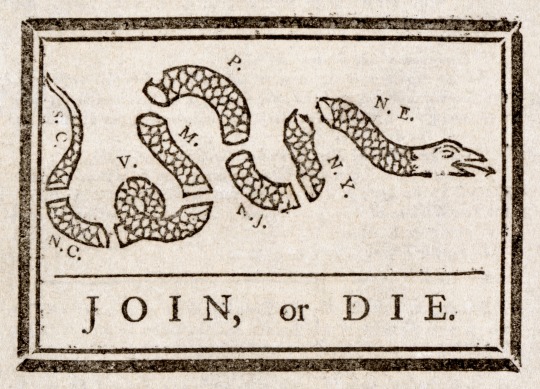
(For non-Americans, the colonies, as depicted from left to right, are South Carolina, North Carolina, Virginia, Maryland, Pennsylvania, New Jersey, New York, and New England.)
It may seem weird to think about it now, but my country was very much the underdog in any conflicts until the early 20th century. Defeats came often, and were, at times, devastating. War support would be extremely difficult if not for the sense that we were one people with something to defend. It's Tribalism, for good or ill. It's the same phenomena that results in sports fans going crazy when their team loses (or wins!) or makes people jump up to defend family members they may not even like. Everyone wants to "belong" to something, and, here in America, we created a sense of belonging to a country.
I'll admit that the American sense of patriotism came as a result of the cultivation of an "us vs them" attitude. The easiest way to get even a more modest US citizen to start waving a flag is for a foreign individual or state to insult our nation or culture.
The love of country still has a pragmatic component today, though. We have always been a nation of mixed cultures and ethnicities (even though some of them had no say in the matter), but that is true even more so today. Having a strong national identity and pride helps bring these different cultures together. While we still have no shortage of backwards, bigoted people, most of us welcome new additions to our culture.
Sadly, this concept of a unifying identity has been repeatedly challenged. One group or another would be deemed as "Un-American" or inferior, often by the more conservative among us. I imagine America's history of racial abuse and discrimination is known outside of my country. There's also the horrible crimes committed against the Native Americans and the internment of Japanese-Americans during World War 2. Socialists, or, indeed, any simply suspected of socialist sympathies, were often persecuted during the Cold War. The new millennium saw rising hostilities against Arab-Americans. This too also contributed to the American sense of patriotism, as these groups would sometimes go to great lengths to express that their political opinions or cultural backgrounds didn't diminish their love of country.
When it comes down to it, though, our patriotism and Fourth of July celebrations draws on that original underdog element. While I doubt anyone would call America the underdog anymore, we were still a country that probably never should have existed. By all rights, we had no business defeating the British in the Revolution. We somehow repelled a British invasion in 1812 (that we provoked, but still). The Union struggled massively early on in the Civil War in 1861 and came pretty close to having to deal with the British allying with the rebellious Confederacy. We are proud to be Americans for, if nothing else, simply managing to have the chance to be Americans.
We have no shortage of sin. Anyone who says otherwise is nationalistic, not patriotic. One of our greatest cultural values is the freedom to criticize our government, but the more extreme of us tend to forget that. Our military and political power also tends to result in being too willing to get into conflicts, often without a plan as to how to get out. We can often now be the snobs looking down our noses at the rest of the world. We're the ones fighting against the underdogs, at times suffering humiliating defeats. I personally feel we need to be humbled, at times, though.
Being such a diverse culture also means that sometimes the "wrong people" get power. Internal strife can become great, as disagreements as to how to run the country escalate and permeate every corner of the country. It often brings family member against family member, neighbor against neighbor, colleague against colleague, friend against friend. These celebrations are also a means to remind us, when things cool down, that we are still one.
At the end of the day, the same values and freedoms that we celebrate with our patriotism bring about the need for the patriotism. It's something of an oddly paradoxical cycle. Without the unifying sense of being of one country, the freedom to dissent, the freedom to express your religion or culture, and the freedom to express your individuality could all result in America and its culture breaking apart into separate entities. Oddly enough, it's these freedoms that ultimately bind us together, even if we each secretly feel that our neighbors are morons who have it all wrong.
As for why we call ourselves Americans, well, we simply don't have better options. The official name of the country is the United States of America. We wouldn't call ourselves United Staters, as that part of the country simply indicates that we're comprised of (currently 50) partially autonomous states. We'd more likely go back to calling ourselves by our individual states. For example, I'd identity myself as a Pennsylvanian. As far as I'm aware, people don't celebrate their individual state quite as much, with possibly the exception of Texans. The America part is the common element that binds us, so we become Americans.
I have heard of the German reluctance to express a sense of national pride like we do here. I can certainly understand that reluctance after what happened with the Holocaust. I think it's important to remember where you were. I fear my country sometimes tries to ignore the darker parts of our own history. I think our patriotic spirit remains because we like to believe we've grown past those events. In some ways we have, but I fear we often look the other way when it comes to remnants of those events. I admire Germany's refusal to forget what's happened, though I do think you might be punishing yourselves a bit too much.
For the record, I think we often overdo it with the patriotism. I don't agree, for example, with having kids recite the Pledge of Allegiance in school. I'm not sure how seriously most parents or kids take it anymore, though. It's mostly just become routine by now. I also don't buy into the whole "America First" garbage. Yes, our government has a responsibility to look out for our interests, but it shouldn't come at the expense of the needs and well-being of other countries.
I hope this somewhat answers your questions. I imagine I may have some errors with my facts or interpretations. Like I said, I'm no historian. This is simply my understanding of the matter.
11 notes
·
View notes
Note
Can you explain how a slave revolt in the Bahamas could have changed the history of America?
HELLO ANON FROM LIKE FOUR MONTHS AGO! I kept meaning to go back to this and then uhhh forgetting to do that. (Also thank you for indulging me and sending this sort-of-directly-asked-for-question lmao)
So. Here’s a brief overview of how a successful slave revolt like in Black Sails could have changed the history of not just America, but the entire world. And quite, well - easily - had the circumstances in Black Sails presented themselves.
First off, standard disclaimer that this is all conjecture based on my own research and knowledge of both history and Black Sails. It isn’t meant as a takedown of anyone else’s views, or the character’s actions. The strongest I would call this is a wishful critique of the choices the writers made to include the things they did in the way they were included, and the way those same writers chose to end the story they chose to tell. And maybe, a little bit, a frustration of how the inevitability of american history is used as a given in fandom to defend certain character’s actions - but it is not meant to invalidate the reasons behind those actions. Just to point out that those reasons were more emotionally than factually driven (Which is cool! And very real to the kinds of tragedies that play out in real life revolutions! Vive le realismé!)
Also quite obviously I’m not a professional in any way. I was eating soup from a can as I wrote this. I am now eating cookies for dinner. I am writing this because it’s fun for me. It’s fun!! If deep thought-experiment type analysis of media isn’t your cuppa, that’s fine - you can keep scrolling.
I’ve included major historical events from 1700-1740 since that is the general time period that Black Sails draws its history from. In particular, most of the later seasons’ historical references come from the 1730s. While I’ve tried to be as thorough as possible...there are so many ways history could have been changed by a tiny action that it would be impossible to cover them all. For brevity, I’m focusing on the history of the Bahamas, the Caribbean, and Colonial America. I’ll touch on other places as is relevant but like......it’s world history for a reason.
Okay, here goes.
So first and foremost, to understand how it’s destruction could have changed America, you really need to understand just how much economic power chattel slavery gave colonial empires and England in particular.
Slavery was the most important economic force in Colonial England, and not just in what the slaves produced. The slave trade itself was the most lucrative business in existence at the time. If you want to learn more about that, I highly recommend listening to this podcast, which does an excellent job of explaining how the economic buying and selling and bonding of slaves was of such value to colonial empires. This is important because the most powerful contemporary argument for the continuation of slavery was that it “could not be ended in the Americas until there was certainty that it wouldn’t create social or economic irritation.” (Thomas Jefferson, 1783.)
(Slavery in itself is not something that was unique to the british empire or even the Imperialist governments that created it. Most cultures have had some form of slavery. However, this was not the type of generational slavery that colonial empires employed. In most cases before the 1400s, slaves were not kept slaves solely based on the color of their skin - they were war prisoners, criminals, or debtors. In most cases, slaves could work to buy their freedom, and most importantly, slavery was not an inherited state that passed from parent to child.
What we think of in terms of colonial slavery is chattel slavery - which is the kind of slavery Europeans imposed on Africans starting in the fifteenth century. These slaves could not buy their freedom. They were viewed as property instead of human beings based on their race and their children were automatically enslaved in the same way they were. They were mistreated, and viewed as subhuman, without any chance of escaping the bonds which had been forced upon them.
Because of this new type of slavery that started in the colonial era, Europeans needed to justify why they were entitled to own other people as slaves. They needed to convince themselves and other people that there was some moral justification for chattel slavery. This is what led to all the myths of ‘happy’ servitude, racial inferiority, and any ‘benefits’ slavery imparted to slaves. These were all lies created by philosophical thinkers and plantation owners and politicians that let settlers convince themselves they were not committing crimes of immense magnitude against other human beings. For much of the colonial era, these were the norm in thinking and their vestiges still linger today. But these were used to justify slavery because of how important it was economically.
And of course there were always dissenters. Since slavery was first introduced to the colonies there were people who knew that this sort of treatment was just not very gucci. These people argued that slavery went against the very nature of a ‘just’ society. That benefitting off the mistreatment of other human beings was akin to spiritual robbery, and that “European colonies should be destroyed rather than create so many unfortunates!” (Louis Jaucourt, 1754). With your goddamn motherfucking chest Jaucourt. The Quakers of Pennsylvania were strong proponents of abolition since the 1670’s! James Oglethorpe(yes, that Oglethorpe) himself was a staunch abolitionist who went as far as to make slavery illegal in Georgia when he formed the colony in 1733.
The economic power of slavery was used as a justification to keep it intact for hundreds of years and many colonists were happy with this, but it’s important to remember that not everyone was. England and the colonists were far from unanimously in support of the practice. This becomes important later! Like, this is the basis for the whole argument of how a drawn out war in the Bahamas could have ended slavery and changed colonial imperialism.)
OKAY NOW THAT WE’VE GOT THAT COVERED.
Now let’s go to the people it affected. Enslaved black people have been fighting against their enslavement since they were taken from their homes and brought across the Atlantic in the 15th century. Starting in the 1700s, slave revolts started to see more and more success in these efforts, until in the late 1700s and early 1800s public opinion of slavery finally dropped enough that it was outlawed in the colonial empires of England and France. In the years of 1700-1740, there were several rebellions in the North American area including:
1712 New York Slave Revolt (British Province of New York)
1730 Chesapeake rebellion (British Chesapeake Colonies)
1733 St. John Slave Revolt (Danish Saint John)
1739 Stono Rebellion ((British Province of South Carolina)
1741 New York Conspiracy (British Province of New York)
And of course,
1728-1739 First Maroon War (British Jamaica)
This is the war which the war in Black Sails is based on. The treaty that was offered by Woodes Rogers in Black Sails is almost word for word(minus the pirates bit) the treaty offered to the Leeward Maroons in this war. There are references to the factions in this war and even some of the historical people involved in it. The major difference? The Maroon war was successful. The Maroons were so good at warfare on their turf that the British were unable to sustain any major victories against them. After ten years they offered the Maroons a treaty granting them governmental agency(although not independence). In return, the Maroons agreed to return any escaped slaves back to the British, and to help the British fight off “invaders”. The Leeward maroons led by Cudjoe(Julius, in Black Sails) took this offer to avoid more fighting because he believed in an honorable peace with the enemy. Queen Nanny and her Windward Maroons(The Maroon Queen and Madi in Black Sails) refused because like....bruh those terms suck. After a year she was pressured into relenting by Cudjoe, but within thirty years the Maroons had started another war, dissatisfied with how the treaty was being carried out.
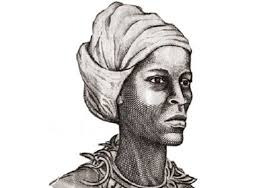
(This is Queen Nanny. And yes, she is better than you.)
I also need to mention that Africans were not the only ones in North America hurt by British Colonialism, nor the only ones for whom abolition and an end to colonial empire was attractive. The Native Americans were also a constant frustration to the colonies, and, because it’s relevant to later things, I want to mention one incident in particular:
The Yamasee War (1715-1717)
The Yamasee were a Lower Creek tribe that lived in what is today Georgia/Florida. The war was fought over a bunch of different things, including trading systems and colonists depleting the game in the area, but also because of the colonists’ nasty habit of trying to enslave Native American people. Bummer. So a bunch of tribes(and I mean a bunch - there were Shawnee and Cherokee factions, as well as about half a dozen other distinct nations that joined in the fight in sort of that loose ‘hey you hate these guys? we hate these guys!’ way.)
Long story short, this war was a pretty significant factor in the colonists in the South not enslaving(outright) Native Americans anymore, and instead increasing the import of African slaves to the south. After this war the Yamasee split into two factions, one anti-colonist and one pro-colonist. The pro-colonist people called themselves the Yamacraw, and it was these people who granted Oglethorpe(yes, that Oglethorpe) the land which he used to found Georgia. Moral of the story, alliances between abolitionists and indigenous tribes were already in place in the colonies. Just waiting for a chance to be used.

(Tomochichi, the leader of the Yamacraw and very cool accessorizor)
(Yet ANOTHER thing to keep in mind is that before the end of the 18th century, both Haiti and Grenada would see major revolutions against their colonial empires. Slaves in all provinces and colonies were continually fighting for their freedom. What they lacked was a unifying force that supplied them enough power and cohesion to fight the empire man-to-man, so to speak.)
SO. INTO THIS SCENE, ENTER JAMES FLINT - ANGRIEST OF MLM SCALLYWAGS AND TACTICIAN EXTRAORDINAIRE.

(So cute.)
Anyway, the Golden Age of Piracy was largely over by the early 1720 - most of the pirates of Nassau took Rogers’ pardon and reintegrated as citizens of society. That or they like....died. A lot of them died. Gruesomely. Nasty business, piratry. So, if we assume that in Black Sails’ history that Flint and Silver managed to convince the Maroons to rebel ten years earlier, join with the pirates who did not want to assimilate, and start a revolution; now instead of two separate wars Britain is now fighting one much bigger, nastier, more expensive one.
Backed by people with a good deal of money at their disposal. Cha-ching.
Keep in mind that Britain had already been at war for almost thirty years with first the Glorious Revolution and the Jacobite risings(1688-forever) and the War of Spanish Succession(1701-1714). Their resources had already been depleted. And this was why the American colonies(and India) had become so important to them. Remember what I said about the economic importance of slavery? It’s because Brtitain was using the slave trade to refill its coffers after an extensive and costly military campaign.
So now, this new war is not only putting an additional drain on the empire’s resources before Britain has had a chance to replenish itself but it is also taking away the very source of income needed to replenish itself. (Since the war would target places heavy with slave trading.) In addition, the pirates handed a significant defeat to the British Navy that ended with the Navy retreating - turning tail and running from the island. This was actually a huge victory and one that was sort of downplayed in the show but would be incredibly significant in the event of a long campaign.
Rogers is not taking Nassau with the full support of Britain. He is only fighting with the traitors who did not return when the Navy withdrew. That is why he has to go to Spain in the first place.
The show has also told us that this rebellion is already starting to be widely known - pirates and slaves from Barbados, the Bahamas, as far as Massachusetts are coming to aid the rebellion in the hopes of freedom. This is not a small thing.
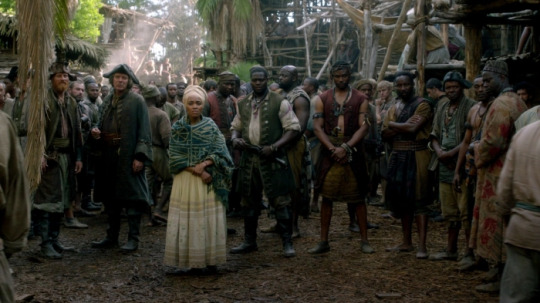
Even with the loss of the Walrus and most of the Walrus crew, there are still thousands of fighters on the Maroon Island. Slaves, mainland pirates - the defeat of the Walrus was a personal defeat but in the grand scheme of a larger war it was a small loss in what was ultimately a huge victory.
Rogers has been squarely defeated. Because of that, they now have Nassau as a base. The war now has two strongholds - one protected by the forest and one protected by a fort - into which they can store supplies, retreat, and organize attacks from. If they can free the rest of the slaves on the island of Nassau and either oust or convert the puritans, all the better.
The war at the point Rogers is defeated was far from a never-ending thing. In fact I would say that Flint is absolutely right - they are incredibly close to a decisive victory. England cannot afford to muster a large enough force to defeat two entrenched enemies working together - especially ones as well financed as we’re led to believe the chest would make the Maroons and Pirates. Even if Britain could somehow convince Spain and/or France to join them, both of those nations have also been severely depleted by wars of their own. And again, the more nations that Britain brings in, the more potentially disaffected people could be brought in to join the pirates(see, Haiti and Grenada specifically, both of which were French colonies at the time, and the Spanish colonies of Cuba, Puerto Rico, etc).
So from here, the smartest thing for the rebellion to do would be to hit large plantations: to both free the slaves and cripple Britain’s economy. Make slavery more costly to enforce than it is profitable to sustain, and build their numbers for the war as well, as well as like, you know, freeing slaves. Make it so that Britain could not sustain the cost of trying to fight it - as James said all the way back in 1705. Force a surrender on economic grounds.
So now, the power behind the empire has been broken. Even assuming a modest victory, the course of the entire world - not just the Americas - has changed. In victory, let’s say the Bahama/Caribbean islands are freed from British rule. Slavery in the americas will also never be able to get the foothold it does, historically.
With a free nation actively willing to target slave plantations and ships sitting between it and Africa, the colonial slave trade is finished. Now sure, they could use the existing slaves, but it would be oh-so-easy for the Pirates and Maroons, alongside their hopeful new Native and abolitionist allies, to target large plantations and cripple them.
If slavery never gets a foothold in the south, northern colonies never build the banks and mills and economic powerhouses that profit from the cheap produce, and most find another way to survive. Perhaps, if we’re going really all out, they start working with the native americans - learning ways to cultivate and grow crops with the land and in balance, rather than clearing thousands of acres for damaging cash crops.
I want to be really, really clear about this because it is incredibly important. Without slavery, the British empire would not have bee able to sustain itself. It would not have the power. And the more it tried to tax the colonists to recoup its losses, the angrier those people were likely to get, and perhaps join the Maroons and Pirates, or perhaps evens start the american revolution early - maybe even with the help of the newly independent Jamaican/Bahaman island nations.
This break in the power of colonial empires would shift world history into something unrecognizable as we know it. The empires would still exist, of course, but they would be set on their heels - France and Spain would see what happened to Britain and be less inclined to keep slavery legal in their own colonies. Power is split more evenly among the world, and indigenous and black/African nations are not wiped out in genocidal bids for power.
Which brings me to India. If the Indian rebellions learned of what happened in America and the Bahamas, or if america had drained enough of britain’s resources that the British East India Trading Company was not able to be as controlling of the area, this could have meant independence centuries earlier, as well as a much easier path to independence. Think about what could have been if the Indian people had been able to oust a struggling empire from its shores an entire century before it historically did.
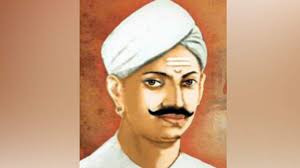
(This bad boy is Mangal Pandey, who led the first major Indian revolution in the mid 1800s. In the movie adaptation his boyfriend best friend is played by Toby Stephens so I’m connecting the dots.)
Once the colonies of America and India are gone, Britain loses almost the entirety of its colonial power. (And this isn’t even including all the smaller colonies which could cloak their own independence in these big revolutions and the lack of (as much) of an indigenous genocide in many of these places. The economic disparity that defines Black experience in places that the British colonial system touched never gets a hold, and they are able to build their own economies in ways that benefit them and the places they live.
Think about the wealth of culture in ALL nations that would not have been destroyed, had Britain not been allowed to swallow whole swaths of land whole.
And, look. I know this is fiction. I know that of course, none of this happened, and that Black Sails is a fictional landscape. I know that so many things could go differently than I imagine them. I know that to extrapolate like this relies heavily on actually caring about a world that is completely different from ours and envisioning how that could come about.
I also know, that it is just as important to tell these sorts of stories as telling stories about how small acts could have changed things immensely, as it is to tell them about how society must stay the same. It is just as important to tell stories about ‘what if colonialism were able to be stopped’ as it is to tell dystopian stories about the end of the world. It may not be as much fun, but it is important to remember that our power doesn’t lie an indiscernible amount of time in the future, after the world has already gone to shit. It lies with us, right now. And that even if it is hard to see, our actions have the power to shape history.
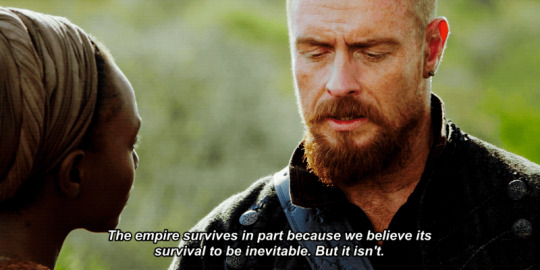
#annyway have a BUNCH OF FEELINGS AND HISTORICAL FACTS BUNDLED TOGETHER AS FANDOM META#black sails#milos black sails meta#black sails and colonialism#james mcgraw#madi scott#uhhhhhhhh#historical meta#IDK MAN WHAT TO TAG THIS JUST INDULGE ME AND READ IT LMAO#long post#god i hope the readmore works lmao#Anonymous#black sails meta
72 notes
·
View notes
Text
âmes soeurs | part two
m. de lafayette x reader
Summary: Lafayette and Y/n Howe were childhood best friends. It’s been years, but somehow they’ve both ended up in revolutionary America. On different sides of the war.
masterlist | part one
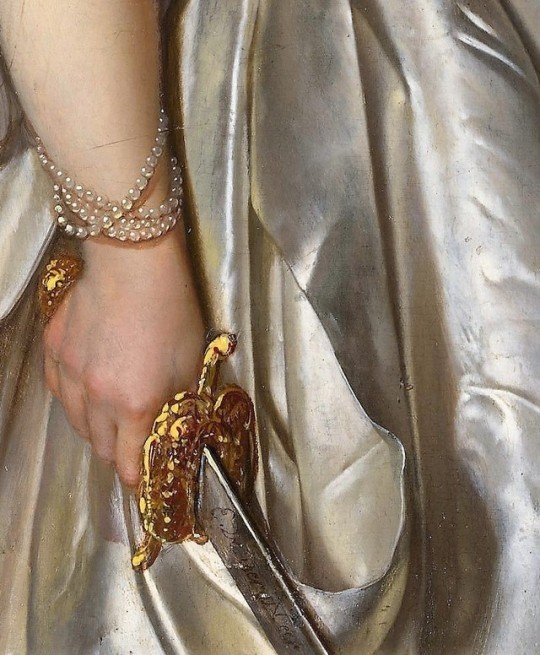
BOOM!
A gasp escaped Y/n’s lips. Did she really just shoot someone? And just because he wore a blue coat instead of a red one? What was he guilty of, fighting for freedom? The flintlock pistol in Y/n’s hand billowed smoke still and felt hot to the touch. Her shaking hands dropped the pistol on the forest floor, but they continued to grip the sword she held.
Looking up at the rebel in front of her, Y/n saw that he was still standing. Had she missed? He was only a few feet away from her and the flintlock was known for being incredibly accurate. Y/n reasoned that she couldn’t have missed her mark, and that the rebel would collapse at any second. But he didn’t.
The soldier whipped his head around to face her, looking more surprised than pained. He patted down his torso as if he were looking for a gunshot wound, but he never found one. He stared at Y/n’s silhouette in bewilderment, bristling when he saw the sword at her side glimmer in the moonlight. The soldier muttered some kind of disgruntled word and drew his own sword. He advanced toward Y/n, and she began to panic.
Y/n took a few steps back, but quickly found her back pressed to a tree. Going backwards wasn’t an option at this point, and the soldier was gaining ground quickly. Adjusting her grip on her sword, Y/n held it up to her opponent, and soon there was a clash of metal between the two.
This soldier was clearly a better swordsman than Y/n. In fact, it had been years since she had even held a sword. As she did her best to parry his attacks, the soldier came back again and again. His hits weren’t brutally strong, but they were fast and in just the right places, proving further that he must’ve been an experienced swordsman.
With sweat running down her neck, Y/n did her best to hold her sword tighter when the soldier delivered a powerful blow. She didn’t have much time to recover when he attacked again. This time, the soldier was successful in disarming Y/n and knocking her to the ground. The forest beneath her hands, Y/n scrambled backwards. She wouldn’t be able to outrun him. He raised his sword, and Y/n was only left thinking this is the end. The sound of metal cutting through air could be heard, and then --
Nothing?
Y/n was expecting to hear the sound of his sword cutting through flesh. At the very least, a sharp pain in her side. There was nothing. Was she dead? Is this what dying was like? Just quick and painless? No, Y/n could still feel the leaves and dirt beneath her and the chill of the evening breeze in her hair. She couldn’t be dead.
Daring to open her eyes, Y/n saw that the soldier seemed just as confused as she did. Upon noticing that she had not been effected, the soldier regained his purpose. He raised his sword again. Y/n flinched. And again, there was nothing?
“Why can’t I kill you?” Asked the soldier. He wasn’t angry, more confused.
“I... I don’t know,” Y/n replied honestly.
He cocked his head to the side and pointed his sword at Y/n once more. “Who are you?”
Not seeing the point in lying, and being too exhausted to continue fighting, Y/n raised her hands in surrender and slowly removed the hood of her cloak.
“I’m Y/n Howe.”
The soldier immediately lowered his weapon and took a step back from her.
“Y/n?”
“Do I know you?”
Stepping into the clearing, moonlight lit up the soldiers face. He was taller than she had last saw him, he looked much older, too, but Y/n would have been able to recognize those eyes anywhere. Even after all these years, she could have never forgotten them. And Lord knows she had tried.
“Lafayette!” She gasped. “Is it... is it really you?”
Now sure that this was Y/n, Lafayette dropped the sword in his hand like it burned him. It clattered to the ground, and Lafayette couldn’t believe that he had nearly killed Y/n a few moments ago. He had really tried his best...
“I never thought I’d see you again,” he admitted.
“Disappointed?”
Lafayette laughed. Oh, how she missed the sound of his laugh. “The opposite. When I heard you and your mother had accompanied General Howe to the colonies, I was hoping I’d get to see you again. But then I heard he was leaving back to England, and well...”
“You thought you’d never see me,” Y/n finished for him.
“Yes,” he nodded, “I thought I’d never see you. But I’m so glad I did.”
“I’m glad to see you, too. Although, it could be under better circumstances.”
There it was. The realization of where they were and who they were. She was only here because she was General Howe’s daughter. Y/n couldn’t overlook the continental uniform Lafayette was proudly wearing. And there was also the fact that Y/n had tried to kill him moments earlier.
“Did you...” Lafayette asked incredulously. “Did you try to shoot me? Did you really try to kill me?”
Y/n tensed. “You tried to kill me, too! And you nearly did!”
“Yeah, because someone had followed me from a British party and attempted to shoot me! It was self defense.”
“How did we end up on different sides of this war? We were best friends.”
Lafayette immediately felt guilty upon hearing Y/n’s defeated tone. They really had been best friends. Even if it was all years ago, he had failed to meet anyone like Y/n. He didn’t even want to. Lafayette sighed and tentatively sat next to her on the forest ground.
“I don’t know,” he said. “I always wanted to seek glory on the battlefield, you knew that. Fighting for the Americans seemed right. If they can win independence from a tyrant, so can France, and every other nation.”
“Tyrant? That’s my king you’re talking about.”
“Y/n, you’ve always been the smart one. You must see how King George treats the colonists is unfair. Everyone deserves equal--”
“—you don’t need to lecture me about what is fair and what isn’t. I read Jefferson’s declaration, and I know all about his philosophy on ‘unalienable rights.’ I don’t really buy into it,” Y/n said firmly.
Lafayette was surprised. “You don’t? I thought... I thought this would be something you support.”
“It’s not that I don’t support equality and justice. It’s that I don’t believe these revolutionaries truly believe in equality and justice.”
“What do you mean?”
“They’re selfish. The men who wrote the declaration? Most of them are wealthy slaveholders. Do you understand how terrible it is that they talk about freedom and liberty, all while they buy and sell other human beings? That’s not what equality is. And if they can’t even get that right, what else are they wrong about?”
“Those men—”
“And that’s the second thing! They’re all men. They don’t care about equal representation, they just care about representation for themselves. Lafayette, you’re right, I have always been the smart one. I have spent hours reading and studying while you would go out for long rides on your horse. I’ve dedicated more time than most men to my education, but that still wouldn’t matter. I couldn’t get a job, I couldn’t get a position in the legislature, I couldn’t vote. All this on the account that I was born a woman. And you revolutionaries? You don’t care about anyone but yourself.”
Y/n was out of breath at this point. Years of pent up anger had finally been unleashed upon Lafayette. She almost felt bad. This wasn’t Lafayette’s fault, it really wasn’t. But it was cruel to champion equality and freedom when you didn’t really believe in it.
“I’m sorry,” Lafayette said. “You’re right. We revolutionaries are hypocritical.”
“Hypocritical? Your english has gotten much better,” she muttered.
“The men who wrote the declaration are wrong to own slaves and exclude women. I know that. I will dedicate the rest of my life to fixing that wrong. But right now? Right now I have the chance to fight the injustice that is the British government. It’s a revolution, Y/n. And if we succeed, we’re going to be changing the world for the better. This war is just a start. But everything needs a start.”
He was right. Y/n knew he was right. God, she hated it when he was right.
“Maybe I was being too harsh,” Y/n conceded.
Lafayette shook his head. “No, it’s good. I love that you hold me accountable. But I also believe this revolution is worth supporting.”
“I know.” She said it so quietly he almost didn’t hear her. “I know you’re right, and you know why I can’t support this revolution.”
Lafayette did know why. Y/n never had much of a choice, and she was always loyal to those she loved. He couldn’t even imagine being in her shoes.
“Can we just not talk about this anymore? Can you just hold me like you used to? I just want what we used to have, even if it’s just for a little while,” Y/n said softly.
She didn’t have to ask twice, Lafayette’s arms wrapped around her and pulled her to his chest.
Lafayette and Y/n were both so deeply flawed. It was all they knew how to be. But this moment they shared together? It could only be described as perfect.
How good did it feel to be in his arms again? It had been so long. Being without him was like living in a barren field covered in snow. Y/n had been content with her life without him in it, but that was when she couldn’t remember what life was with him. It was golden sunbeams and turquoise streams. It was stolen kisses on hot summer nights. It was music and flowers and everything wonderful. Life with Lafayette was all that and more.
The rain started coming down in droves. Maybe it didn’t want her to have to fall alone.
tags: @ballerinafairyprincess @dannighost @ateliefloresdaprimavera
#hamilton x reader#hamilton#hamilton imagine#lafayette x reader#hamilton fanfiction#lafayette imagine#daveed diggs#marquis de lafayette#daveed diggs x reader#thomas jefferson x reader
200 notes
·
View notes
Photo
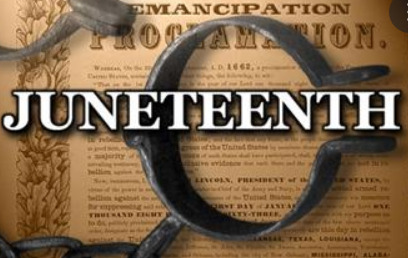
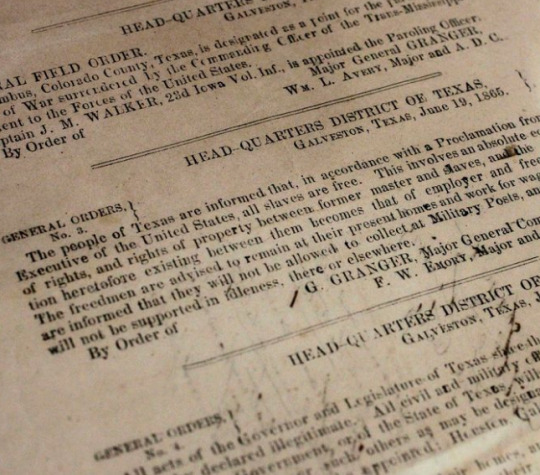
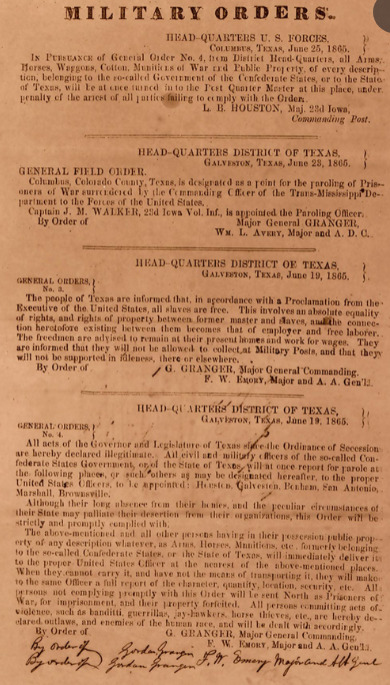
Why did the Emancipation Proclamation not free slaves?
As early as 1849, Abraham Lincoln believed that slaves should be emancipated, advocating a program in which they would be freed gradually. ... The Emancipation Proclamation did not free all slaves in the United States. Rather, it declared free only those slaves living in states not under Union control.
Despite this expansive wording, the Emancipation Proclamation was limited in many ways. It applied only to states that had seceded from the United States, leaving slavery untouched in the loyal border states. ... Most important, the freedom it promised depended upon Union (United States) military victory.
Why were there exceptions in the Emancipation Proclamation?
The Emancipation Proclamation freed only those slaves who lived in areas that were in a state of rebellion against the United States. This limited its impact because any slave in an area that was not rebelling was not freed by the Proclamation.
Why would Lincoln only free the slaves in the states that were in rebellion and not all of the slaves throughout the country? The president did not have the power to end slavery within the United States; this would have been a matter of changing the Constitution, which cannot be done by the president alone.
When were the last slaves set free?
Confederate soldiers surrendered in April 1865, but word didn't reach the last enslaved black people until June 19, when Union soldiers brought the news of freedom to Galveston, Texas. Excerpt from google
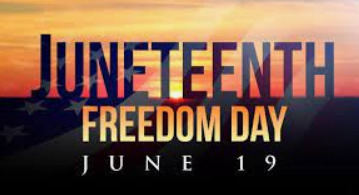
JUNETEENTH: ON THE FREEING OF THE LAST SLAVES IN TEXAS
Then, on June 19th, 1865, General Gordon Granger read General Order No.3, a simple proclamation, from the balcony of the Ashton Villa in Galveston, Texas.
“The people of Texas are informed that, in accordance with a proclamation from the Executive of the United States, all slaves are free. This involves an absolute equality of personal rights and rights of property between former masters and slaves, and the connection heretofore existing between them becomes that between employer and hired labor.
The freedmen are advised to remain quietly at their present homes and work for wages. They are informed that they will not be allowed to collect at military posts and that they will not be supported in idleness either there or elsewhere.”
Thus, the Juneteenth proclamation said that slaves were free from bondage, but were not going to be allowed to leave their masters or to seek military protection — hardly a resounding proclamation of unbridled freedom. General Granger had arrived with 2,000 Union troops just the day before, to enforce the order.
In the Emancipation Proclamation, Lincoln had exempted those slave states not involved in the Confederate rebellion: Kentucky, Maryland, Delaware, Missouri and the territory which is now West Virginia. He also exempted the captured territories of Tennessee, Louisiana and Southeast Virginia. The Emancipation Proclamation was meant to disrupt the institution of slavery only in those states that were in rebellion and fighting the Union in the Civil War.
Until the day that Lincoln was assassinated, he worked on several different fronts, not always in line with the high ideal that once the slaves were freed they would be welcomed into the post-war society. In his book, What Lincoln Believed: The Values and Convictions of America’s Greatest President, historian Michael Lind explains that, in 1862, Lincoln appointed James Mitchell, former director of the American Colonization Society (ACS) in Indiana, to “oversee the government’s colonization programs.” The ACS was an organization dedicated to solving the “race problem” by moving free Blacks to a government-established colony in Africa. Lincoln “allegedly asked Attorney General Edward Bates if the Reverend James Mitchell could stay on as ‘your assistant or aid in the matter of executing the several acts of Congress relating to the emigration or colonizing of the freed Blacks.’“
In 1858 during his fourth debate with Steven Douglas, Lincoln made a statement that helps us understand his actions in support of the ACS and its mission in 1865.
“I will say then that I am not, nor ever have been in favor of bringing about in any way the social and political equality of the white and Black races – that I am not nor ever have been in favor of making voters or jurors of negroes, nor of qualifying them to hold office, nor to intermarry with white people; and I will say in addition to this that there is a physical difference between the white and Black races which I believe will forever forbid the two races living together on terms of social and political equality.
And inasmuch as they cannot so live, while they do remain together there must be the position of superior and inferior, and I, as much as any other man, am in favor of having the superior position assigned to the white race. I say upon this occasion I do not perceive that because the white man is to have the superior position the negro should be denied everything.”
A cynical person might say that the Proclamation was more the work of a military strategist and avowed segregationist than a great emancipator.
Source: Afropunk.com JUNETEENTH: ON THE FREEING OF THE LAST SLAVES IN TEXAS
Black paraphernalia Disclaimer - images from Google images
Lincoln and Congress did pass the 13th Amendment abolishing slavery in April of 1864. But the Amendment was not ratified by the required number of states until December of 1865, months after Lincoln’s death. Radical Republicans like Charles Sumner from Massachusetts and Thaddeus Stevens from Pennsylvania were the legislators largely responsible for pushing the Amendment through the U.S. Congress.
They were part of the group of Northern legislators who tried to ensure that the freed slaves would be put on equal footing with the white population. During Reconstruction, some progress was made towards realizing this dream. But in 1876, Reconstruction ended and the South plunged back into inequality, embracing white supremacy, Jim Crow and segregation.
Texas was annexed into the Union in 1845 as a slave state. Northern legislators opposed the annexation of Texas as a ruse by Southerners to spread slavery into new territories. They could not have been more correct. Mexico had abolished slavery in 1829, but Anglos coming into Texas worked around this law by forcing slaves to sign contracts saying they had debts to be worked off or were indentured servants — with life-long terms.
In 1836 (during the Texas Revolution) there were 5,000 slaves. In 1845 (at the U.S. annexation of Texas) there were 30,000 slaves. By 1860, there were 180,000 slaves; and by the end of the Civil War, more than 250,000. The reason for the large growth in the number of slaves between 1860 and 1865 was a diabolical one. Slave owners from the Southeast moved themselves and their slaves to Texas to avoid having their slaves taken in states like Mississippi, Alabama, Georgia and the Carolinas during the Civil War.
Emancipation was proclaimed by Lincoln. But it was the slaves, free people of color, and whites of goodwill who were largely responsible for ending slavery, by making the institution untenable. In 1850 alone, an estimated 3,000 slaves from Texas escaped into Mexico. During the Civil War, an estimated 75% of the slaves in Kentucky escaped behind Union lines. In border-slave-states, there were daily pitched battles between slave owners and slave catchers, and slaves, free Blacks, anti-slavery sympathizers and heroic abolitionists like John Brown, who were helping slaves escape, or inciting them to revolt.
The Underground Railroad was also active in border-slave-states helping runaway slaves. Even in the heart of the Confederacy, it is estimated that more than 11,000 escaped slaves lived in and around the Great Dismal Swamp, between Virginia and North Carolina.
So, as we celebrate that fateful day of June 19th, 1865, and pay homage to the last slaves who heard the news about slavery’s end in Galveston, let’s also take a new and larger view and celebrate the true great emancipators — the people of color and goodwill whose heroic resistance helped topple the vile institution.
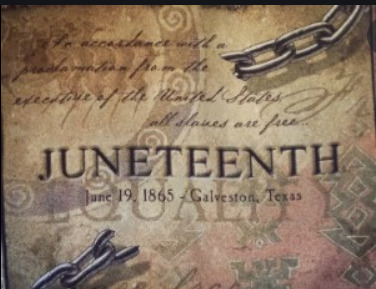
Source: Afropunk.com JUNETEENTH: ON THE FREEING OF THE LAST SLAVES IN TEXAS
9 notes
·
View notes